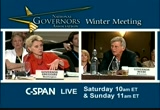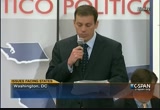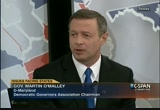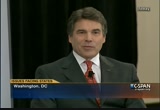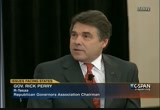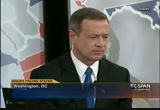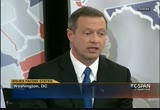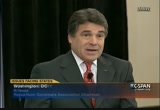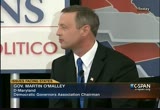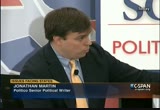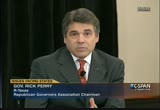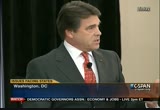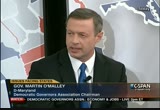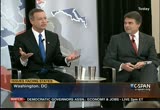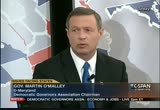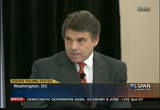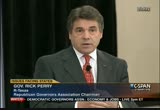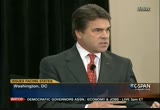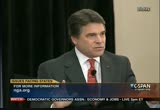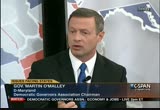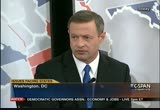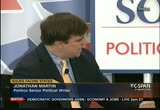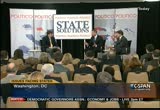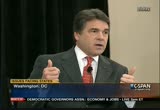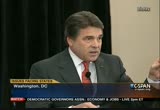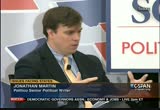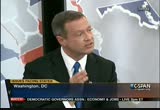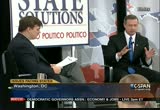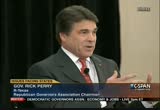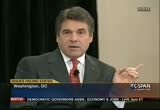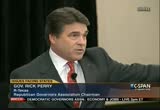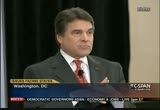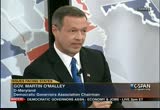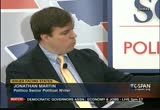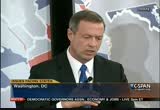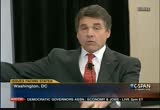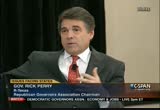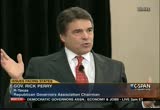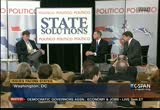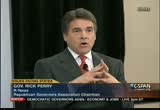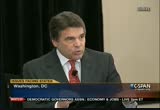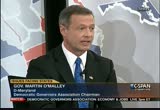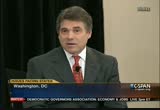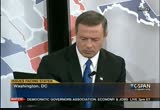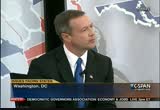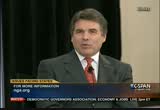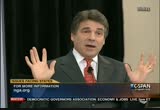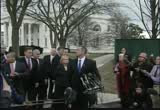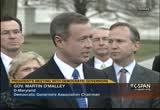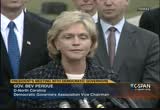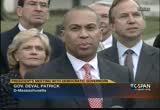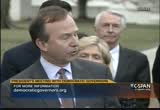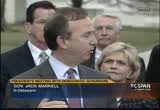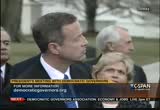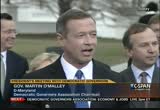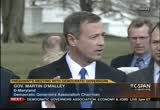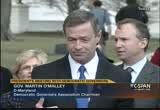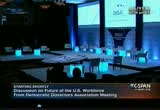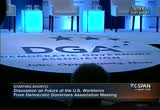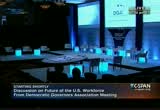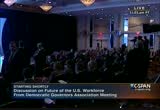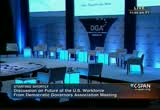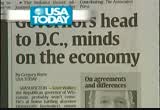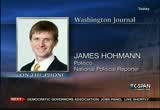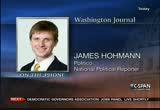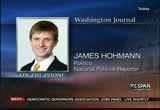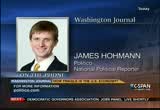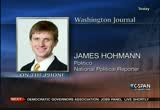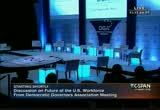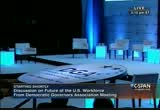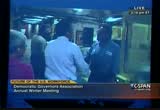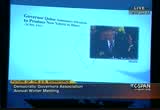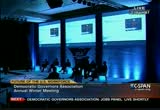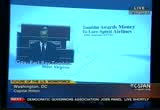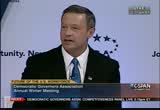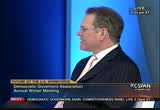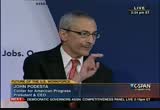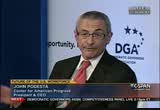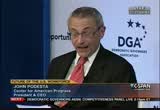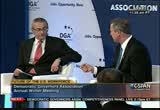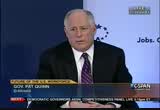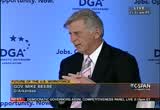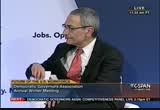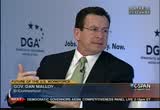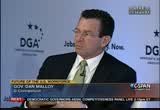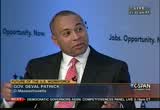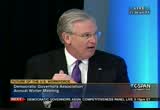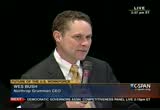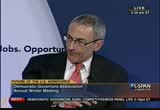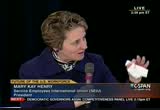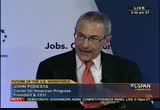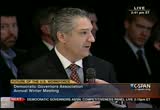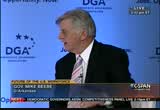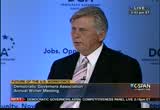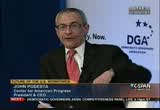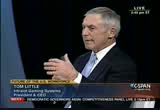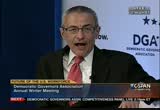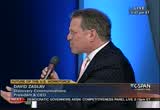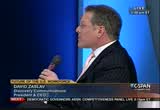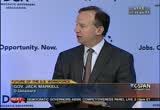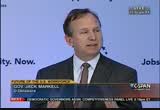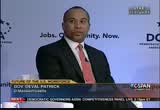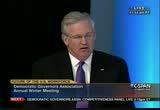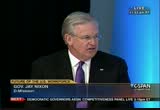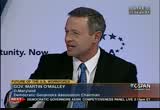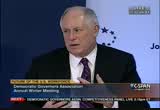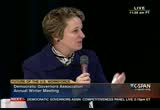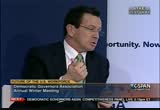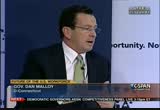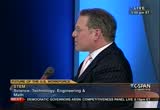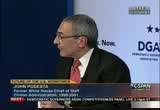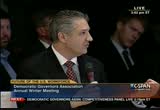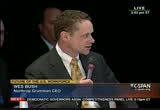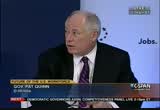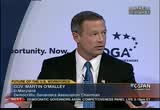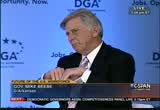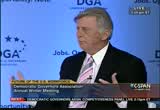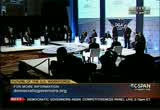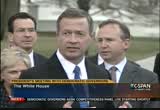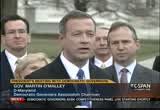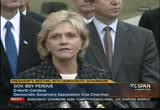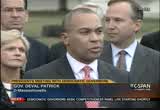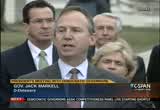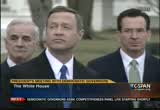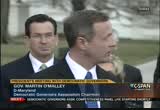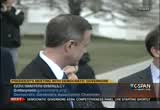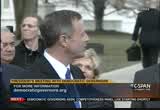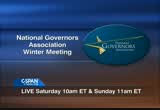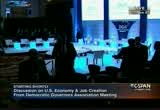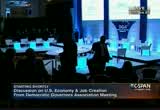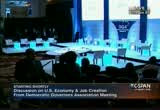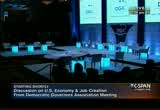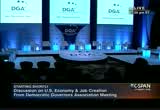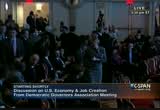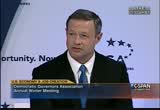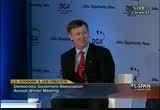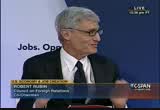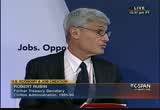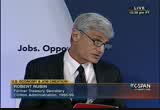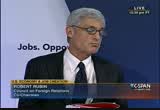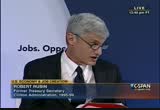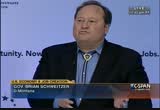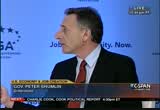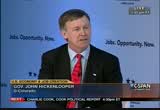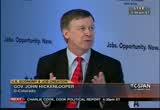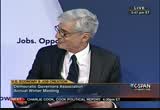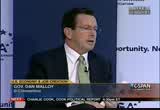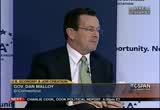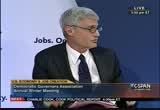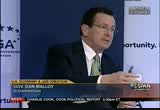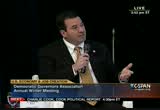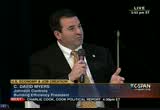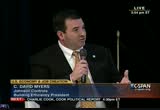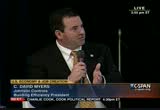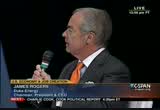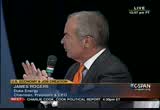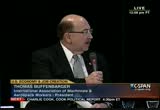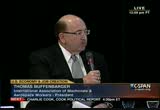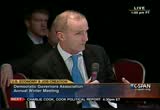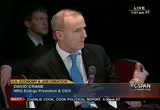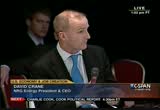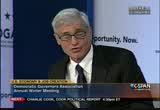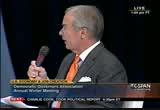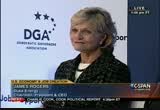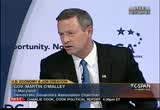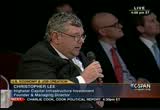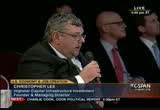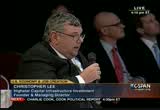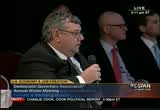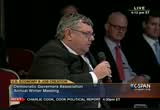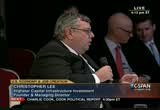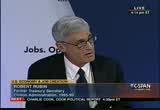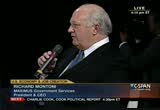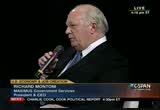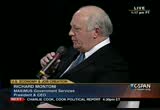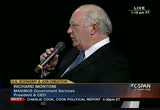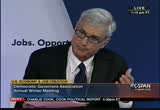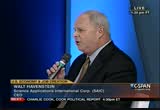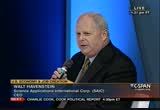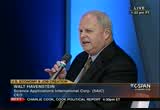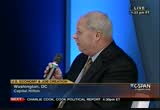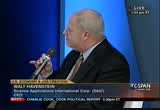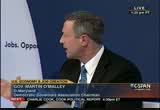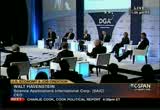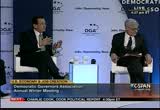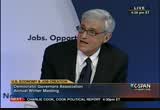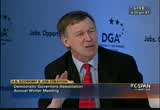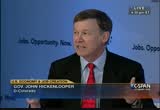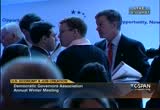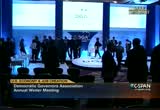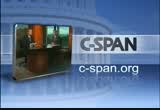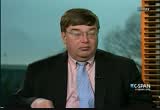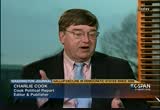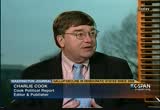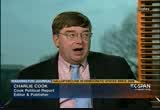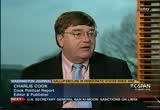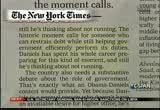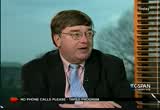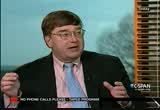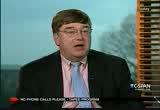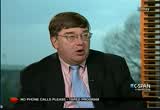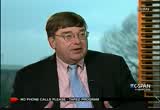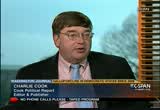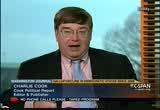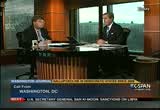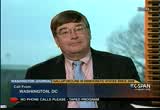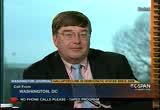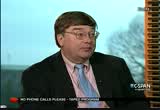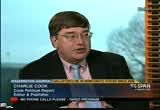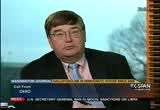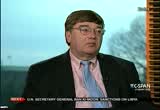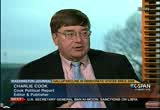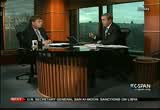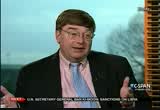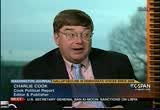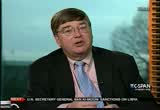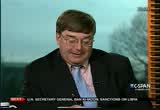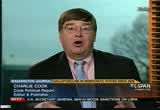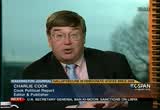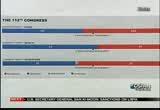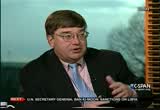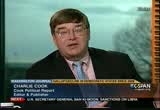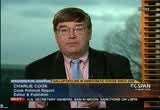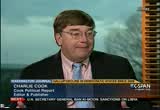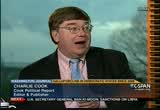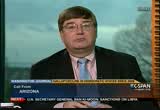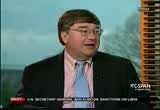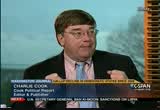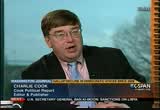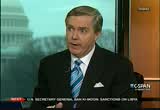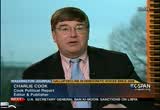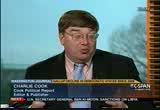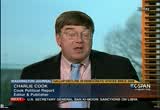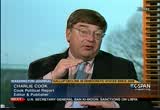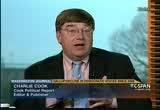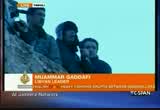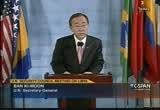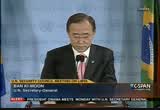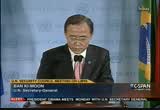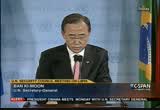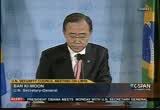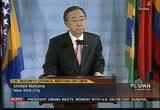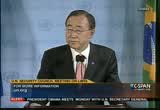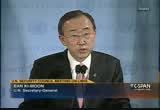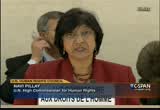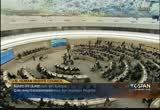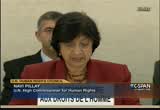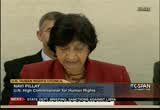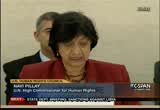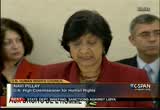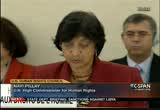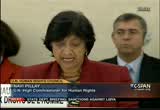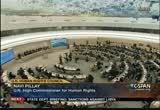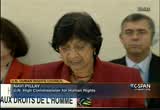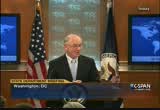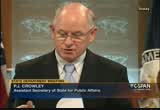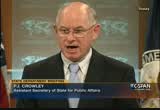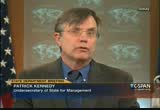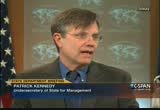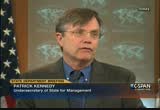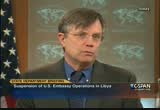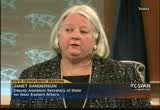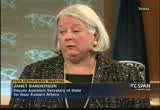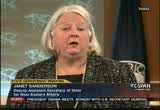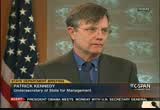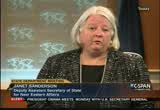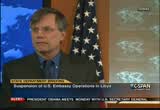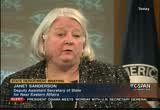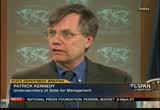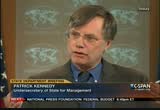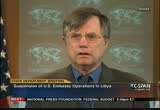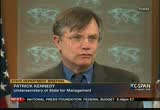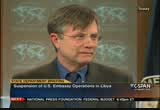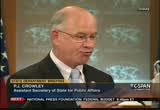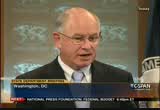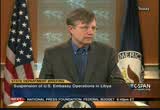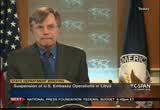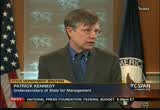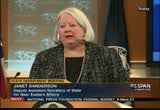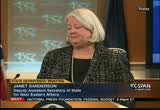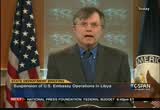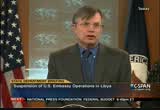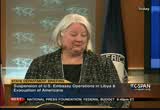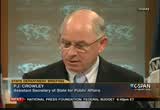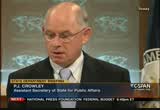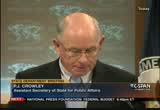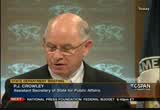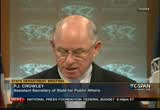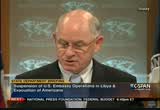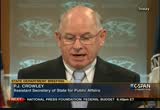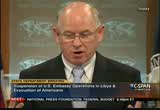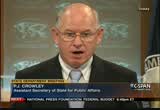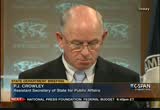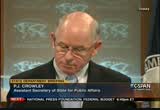tv U.S. House of Representatives CSPAN February 25, 2011 1:00pm-6:30pm EST
1:00 pm
-- the khadafy regime. it is the annual winter meeting of the annual -- international governors association. we will have coverage on c-span. >> this weekend, mike huckabee shares his thoughts on president obama and his possible run for the 2012 presidential election as the gop field begins to take shape. watch wrote to the white house sunday eastern and pacific. >> the democratic governors meet today to talk about jobs and competitiveness in space. that is coming up live at 2:00 p.m. eastern on c-span. earlier today, maryland governor, martin o'malley and
1:01 pm
1:02 pm
>> we are pleased to have to of the most popular governors in the country. we have rick perry and martin o'malley. there are cards by your chairs where you can write questions. i will turn it over to jay martin. >> thank you for joining us here on a rainy day in washington. let's talk about what is taking place in madison in wisconsin. what lessons do you take away from what has happened in madison looking at this stage
1:03 pm
--this standoff going into its second week? >> when you are facing tough challenges and you have to overcome challenges like the imbalances in the pension system, it is best to bring people together to do that. when you try to build five or make one side of the equation the enemy, you are asking for trouble. we all know we have to go through a time of readjustment. the best way is to bring people together. we are asking our public employees in maryland for many of the same concessions as they are asking for in wisconsin. we are not asking them to give up their rights to organize or have their voices heard. >> we have heard of two big deficits. we are asking our public employees to pay more in their contributions. the state will pay more in its
1:04 pm
contribution. these are the things we need to do to be fiscally responsible and move on our state will work. >> governor perry, is governor walker doing the right thing in wisconsin? if you were to give him advice, what would you say? >> we have 50 laboratories of innovation out there. i hope all of you have bought the book "ed up." -- "fed up." >> fast plug. >> we are 50 different laboratories and for me to tell governor walter how to run his state is over the line. we had -- governor walker how to run his state is over the line.
1:05 pm
there was no confusion after the election. that is what they told texas. that is what got governor walker hurts. he knows what he believes in. he is expressing that. the voters in wisconsin basically said this is the person we want running the state. the first amendment is a beautiful thing. they are out there expressing their free will. >> to get to the heart of the matter and stepped back, -- and step back, we know that public employees are a key element of the democratic coalition. in a lot of state elections, it is the enforcement -- the
1:06 pm
enforcer of troops on the ground. it could be a blow to organized labor. >> i think it would be a blow to a lot of things. i do not know any ceo in private industry who would take over an important corporation. are a lot of politics. tax cuts for the wealthy are always pushed to the top of the republican agenda at a time when wealth has not been more concentrated than it is now since 1939 -- not since 1931. beyond that, it is important to bring people together. the governor mentioned what did people tell us in the midterm elections? they told us two things. they told us we need to reduce
1:07 pm
the size of government. what i heard was we need to create jobs. we need to make sure we make the right decisions and the tough decisions now so we can create jobs in this new economy. i do not think the drama and the circus: on with this drive to eliminate unions and punish unions and take them out of the political equation has anything to do with creating jobs. i cannot think it helps to create jobs. i do not think it helps to solve the problems of imbalances in pension systems. >> governor perry, to you what to get in their? -- in there? >> we lead job creation. >> how did you do it? >> you didn't -- you do not overtaxed. you have a regulatory climate
1:08 pm
that is fair and predictable. you have a legal system that does not allow for over-suing. you tell the job creators that you have a skilled work force. that is what we have had in place for a decade in the state of texas. i am quite proud of what we did in texas. >> people vote with their feet. that is the beauty of the 10th amendment. i really do not want washington how to run our business. >> i thinking it is clearly stated in our constitution about the idea that the states have substantial powers. they are limited by the constitution. the 10th amendment is clear in giving the power to the states. having the federal government tried to tell us how to deliver their or educate our children or how to have energy policy is
1:09 pm
foreign to me. i would bet you martin does not want the federal government down here telling him how to run the state. >> do i want the federal government telling me how to run by state? no, but i do not want the federal government shut down. i do not want the federal government to stop it in my country or stop investing in the education, innovation, affordable college that expands opportunity and creates jobs at a time when our world economy is changing. i believe there are some things that are so large that we can only hope to tackle them together. i think our federal government is an important part of doing that. >> there was an article in the newspaper about our health-care waiver. these things are the things people expect us to do to reduce
1:10 pm
spending so that businesses can be more successful instead of investing in rising health-care costs. they can create jobs. these are the things a functioning government does. >> speaking of the fed, i want to ask you about the federal stimulus. a lot of gop governors have more concerns about that. you were one of them. you used those federal dollars to fill buttonholes. when was the impact of the stimulus for texas -- you use those federal dollars to fill budget holes. what was the impact of the stimulus for texas? >> we send much more money to washington, d.c. that is sent back. we are what you would call a donor states. martin said something that was important and what i would like
1:11 pm
for us to focus on. one of the main responsibilities of the federal government is to secure this country. i think all of us realize that is one of the important things the federal government does. a father was a world war ii government -- world war ii veterans. the government should do two things. we have to find men and women to defend our country. he said they were supposed to deliver the mail. preferably on saturday and on time. the key is i want to go back to the security issue. it states that i have the privilege to serve as a club 1 mile border with a foreign country, mexico. -- has a 1,200 mile border with
1:12 pm
a foreign country, mexico. they are our north 1 trading partner. today, mexico is a war zone. it is just as dangerous as iraq. we had an american citizen killed by the drug cartel. i cannot get our federal government to address one of the most important duties that our federal government has, that is expanding the border against some vicious terrorists, the drug cartels. i think it is going to get worse before it gets better. it impacts our economy. it is not just about the security of our people. it is also about allowing this economy to continue to grow between state and country and
1:13 pm
the rest of the united states. >> both of you are facing deficits in your states. governor o'malley, i will start with you. what are you doing to close the deficit and what has been the impact of the red ink? >> this recession has impacted every single state in our union. we have gone time and time again to the legislature which more and more cuts. i now come with the latest budget we have submitted, we are up to $6.60 billion in cuts. we have eliminated 4200 positions. our employees have had to endure furlough days for the last three years. these are the things we are doing toward the end of making our state more competitive and creating jobs in this new economy. the fiscal discipline is critically important.
1:14 pm
without it, no progress is possible. fiscal discipline is a means to the end of expanding opportunity. the governor mentioned the fact that his father certification in the world war ii. -- his father served in world war ii. those men came back to a country that invested in the g.i. bill, raise the education levels and expanded middle-class opportunities in ways we never have before. those are some things we can do together which are the right things to do morally and economically. in our state, not only have we may be cut, we have increased our investment in education. we have been named number one schools in america three years in a row. why do we do those things?
1:15 pm
we know our education levels are tied to our economic future. >> the impact of the stimulus on maryland's? ? >> without the reinvestment dollars, every state capital in our country would have crumbled. there was no way we could have avoided a second great depression if it were not for the recovery and investment act dollars. they were not designed to be a permanent thing. they were designed to bridge states. the governor use those dollars. i use those dollars. every state use those dollars. >> the sites --besides sporting event, it is the most aggressive you get when it comes to going
1:16 pm
after each other. governor perry, the targeted one state when it comes to going after jobs. you are on a hunting mission when it comes to finding jobs. you ticked off some of the folks in california. there was a story in l.a. times the "los angeles times," that said your state is having some problems, too. the treasurer of california told the "los angeles times" about texas. he said, "someone just turned the lights on in the bar and the sex is states does not look so pretty anymore? e." [laughter] california is hitting back here a little bit. but i do not have a problem with
1:17 pm
that except it is wrong. >> that is the name of the game. martin has the maryland initiative. to try to entice companies to come from other places, incentive programs. we have the emerging technology fund in texas. it is highly successful. and the enterprise fund, which has been around since 2003. we are not picking on california. they are a target rich environment for us to -- [laughter] there is plenty to go around. that is the way it is supposed to be.
1:18 pm
i do not try to offend people. i am forward in challenging states to change the way they do business so that there businessmen and women will stay in their state and expand in their states. i will give you one example of how new mexico was successful in during the film industry. -- in luring the film industry. we changed our film incentive to be richer. it is not as big as new mexico has. it does not have to be. people really like to live in austin, texas, or dallas or houston, which is the center of our film work. i do not mind if it is martin or others being critical of texas. at the end of the day, the facts
1:19 pm
are what matter. there were more jobs created in the state of texas in the 2000's. people vote with their feet. that is why i say the 10th amendment is so important. i may not agree with everything martin does. i do not mind stealing those and taking those to my state and putting them into place. at the end, leave us alone is my message to the federal government. let us compete. the people will figure it out. they will go where they want to go. if they want to live in maryland and enjoy the east coast -- >> one of the most intractable issues does seem to be the unemployment rate. it is aboutmalley, 7.5% in maryland. maryland is heavily dependent on
1:20 pm
the federal government, which helps it. i assume that is not good for you. >> no, it is not. everything we have been about since this recession hit us has been getting people back to work. every state has a different set of competitive advantages. the governor talked about those things in his state. we have competitive advantages. some of our areas that continue to grow our science, biotechnology, the joint cyber command and things related to that. we created 5700 jobs with private money at the port of baltimore. when the larger ships pass through the panama canal, they do not pass by maryland. we are gay -- engaged in the global trade. the governor talked about the
1:21 pm
proposal we had before the state legislature, which is in best maryland. it is a way of replenishing our venture funds to allow large entity insurance companies to discount their tax liability. we put that into the maryland bencher fund or some of the fund.ups and -- venture we were named one of the most friendlyneur ship- stake in the country. we are well-positioned to be a winner in this changing of the economy. these are some of the things we are doing. we created a new hiring tax credit for any business that hires a maryland person all of the on the plum roles and gets them back to work. we expanded our life science and biotechnology tax credit.
1:22 pm
we also extended our research and development tax credit. but there is a lot of talk about -- and and the new grain alter -- green motor cars. >> there is a lot of talk about the health care legislation passed by congress. i want to ask you what the impact is at the state level of the health care reform law. governor o'malley, i want to start with you. >> over the next 10 years, we would avoid $150 million in costs that we would incur. the biggest thing is that we will finally get one of the most out of control costs out of --
1:23 pm
all of the backs of our businesses. businesses have been spending 20% for health care coverage. those are dollars they cannot invest in their plants or invest in creating jobs or marketing their products abroad. we believe there will be states that embrace this and are at the forefront of implementing this. we believe the states that do that will become far more attractive to all businesses, especially to those start-ups and those family owned, new entrepreneurial businesses. the states that like it will have a difficult time ever bringing health care costs down in their state. that is the goal in the dop creation. >> i have look for some time or a state that would actually say that the health care bill was good at it helped them. congratulations. you are the first. i say that with all due respect.
1:24 pm
our states are different. the way that you are structured maybe good for you long term. let me tell you what it is in the state of texas. our calculation is that in the next 10 years, it will cost the state of texas $30 billion. i talked to a couple of new governors over the last three weeks. the maintenance requirements in the health care bill are devastating for a state like california. i talked to jerry brown. i will not put words in his mouth. he recognizes the problem of maintenance in the portions of the bill. our solution from the standpoint of health care -- i cannot find anything in the constitution
1:25 pm
that says washington is supposed to tell us how to deliver health care. this is not just the current administration. the previous administration would not give us a waiver to allow us to be innovative and look at different ways. >> i think the states are the laboratories of innovation. martin and maryn fallon in oklahoma programs that they can pick and choose and they can come up with the best ways to come up with health care -- with all due respect to our friends in washington, d.c., they cannot understand how to deliver health care in the geographic and the culturally different areas of texas won -- one shoe fitting all.
1:26 pm
>> the chairs of your respective party committees -- it would only be fitting that we that politics here for a little bit. , you had amalleym yo great year. >> thank you. >> a lot of your colleagues did not fare as well. there are a handful of gubernatorial races. why is that going to be different for democrats that it was last year? if we have not seen unemployment come down? >> as i look at some of these leading indicators, it seems apparent to me that most everybody agrees that we are doing better now. our economy is doing better now than it was two years ago, that it was one year ago.
1:27 pm
the big if is what the economy will be doing and will our people be going back to work in greater numbers by the next election? i think we are going to continue to see the economy improves. we have a long way to go. over the course of time, people will have a better opportunity to evaluate whether the president also called to out- educate and out-in all but the rest of the world works-. -- out-educate the rest of the world can work. people are going to see a strikingly different government philosophy between the republican governors and the democratic governors. we all have to balance our budgets. democratic governors do so in ways that protect the education
1:28 pm
of our people, improve the skills of our people, and get our people a better footing in order to be winners in this changing economy. but there were governors and members of congress who did not want -- >> there were governors and members of congress who did not want president obama on the campaign trail with him. the what president obama with you on the campaign trail? >> every governor will make their own decisions strategically and tactically. the president was an enormous help to us in maryland. his organization was a tremendous help to us. but all must do what on the president -- democrats and republicans alike -- is for him to be successful in getting our economy moving again and creating jobs. >> governor perry, you were chairman of the are g.i..
1:29 pm
-- rga. what is going to be the impact of having president obama on the ticket in these gubernatorial races? >> many in the states believe the massive amounts of money -- they correctly at did find that that money that was spent did not create the jobs the president said they were going to do. in fact, all it did was add to a monstrous debt load. one of the things i have seen across the country, particularly in texas, is that young people are coming back to the republican party. they are starting to understand that the debt that has been created by this administration is monstrous. it is going to have to be paid off by them. you look at a guy who is my eighth and i may be done before
1:30 pm
that gets really becomes incredibly and gullible in our country. you will see -- ind credibly -- incredibly in double -- in incredibledelible. -- incredibly indelible. >> you were hurt in 2008 because people went for president obama. are you worried about the slipping numbers of hispanics when it comes to the gop? >> i think the party can look at us and the hispanic population in the state of texas. they are pro-life.
1:31 pm
they are pro-family and hard working, patriotic folks. you want to keep more of what you work hard for. the republican party is where you need to be. we are making great progress along those lines. i stand up and talk about border security. there are 34,000 mexican citizens who have been murdered by the drug cartels since 2007. in a lot of cases in texas, family members are losing people's lives in mexico. what we are doing to help mexico and help along the border with the hispanic population is going to be -- >> your tone is a lot different from other folks in your party in other states. >> i called out people who
1:32 pm
differ in shape between people because of the way -- the way they look. my brother-in-law is hispanic. we marry each other and do business with each other. the idea that the republican party is not open -- we are alluring to the hispanic population because, as they become more educated and engage in the free-market and the american experiment, they are going to go to the place where they get to keep more of what they work for. that is, generally speaking, by republican administrations. >> may i say i greatly admire that quality in the governor carey. -- governor perry. he does not denigrate people because of their cultural background. we are not entitled to our own version of the facts.
1:33 pm
by 2019, 55% of the federal deficits will have been driven by and created by bush-era tax cuts, tax cuts that benefited the wealthiest 2% of americans in the first decade of our country since the second world war. wages stagnated and started to go down. 30% of that deficits will be driven by the series of ongoing does it warrant our nation has been fighting. only 4% of it has been driven by a recovery and the reinvestment act. without it, we would have been plunged into the end of the great recession. the facts bear out that the things that president obama have done have not given this deficit. there were things that president bush did.
1:34 pm
he took a surplus and put our country in ready -- in red ink. >> i have one last question before we close. it is for you, governor o'malley. you have been about in the dnc. lc. they recently announced they will be closing their doors. what happens? do you worry about moderation in your party? >> when the democratic party has the presidency, it is harder for other groups to sustain themselves. the dlc had a great run. >> what happens? >> when happened was, you saw a successful administration in the
1:35 pm
bill clinton's administration with security, responsibility, opportunity, all of the things that resonate across the board in our country. nothing lasts forever. they had a good run. the dlc is attributed a lot to this debate. this is what i see happening with moderate democrats. you see this in a lot of newly elected democratic governors. and more recently elected democrats, the new generation of democrats are fundamentally not ideological. they are entrepreneurial and pragmatic in their approach to governance. some of the tug of war in party's change competed in relation lead with bill clinton. the- competed -- competed
1:36 pm
erationally with bill clinton. i cannot think of anyone who is successful to be a victim. >> if president obama is reelected in 2012, do you want to run for president in 2016? >> no. >> 2012? present. >sident? >> no. washington has been on a spending spree that has been horrible for our country. it goes back to the washington- centric concept that washington
1:37 pm
knows best. the idea that washington, d.c. needs to tell marchant how to educate children in maryland -- i am not a fan of no child left behind. i do not in washington, d.c. should be telling you how to educate your children. those are your innovative ways to do that. same thing on the big pharmaceutical bill. it was a huge debt that has been put on. it comes back to washington, d.c. one of my goals over the next two years working with the republican governors and the democrat governors -- i think there are a number of governors and in the private conversations there is a little bit more heat not to speak out against a sitting president or a sticking party in power. washington, d.c. is trying to
1:38 pm
tell all about how to run out or states with too much specificity. the cost of that is what is driving the deficit in this country. if we would get back to a substantially leaner federal government, do what you are supposed to do, the standout borders. mr. president, come to texas and defend our borders. then, we might have a conversation about these other things you want to do like come into our state and take over our clean air permiting process. we have had one of the great progress in the country. weekly doubt -- clean up our state more than any other state in the decade of the 2000 plaza. -- in the decade of the 2000's. i thought we would get an award
1:39 pm
for it. but we got epa coming into taxes taking over our air permitting process. i cannot understand that. that is the problem we have in america that we have to address as a country and talk about what is the proper role for washington. it is costing us to spend much money -- too much money. but we have some questions. the first one is -- >> we have some questions. the first point is, how important is technology in our states? >> we were able to compete for and win a federal grant to expand broadbent -- broadband connections in our state. we believe that cyber highway is
1:40 pm
the key to be featured. technology is at the center about our new economy. >> well said. technology is going to find the cures for diseases. in 2005, we passed a $3 billion effort over 18 years of -- can hear -- 10 yfear period of -- 10 year periiod of time to find a cure for cancer. we have not talked about energy at all. as we are seeing the middle east and those areas literally in flames, countries that have massive reserves of oil and gas -- in this country, whether it is in the dakotas or the eastern
1:41 pm
side of montana, there are monstrous reserves. we are using our technology today to find the ways to discover it. 15 years ago, we had no idea that there would be tremendous reserves of natural gas in the four different locations in our country. the formation in south texas. the new technology, there are ways to extract it. the idea that we are not giving tax credits and we are not giving incentives to domestic exploration of our natural resources is beyond me. that should be one of the focuses from our current administration -- to become more energy independence. it is driven by technology.
1:42 pm
whether it is green jobs or cleaning up our environment, it is all in the innovative mind. generally speaking, it is in the states. cracks we are focused on offshore -- >> we are focused on offshore wind. we are excited about pursuing that. we have also done a number of things with technology to reduce energy consumption in our state and advancing green buildings and the technologies in terms of the geo-design and green technologies. >> i want to ask one last question coming back to where we were at the beginning. if we were to have this discussion 10 years from now,
1:43 pm
what will be the role of public employees, public employee labor issues in terms of states, government, state spending, state budget issues? governor perry? what is going to happen here? >> i think every state is going to have to figure that out for themselves. i do not think the federal government should inject itself into the structure of our states. there are some boys try to get elected fraternity president here. but we have more wind energy in the state of texas than anywhere in the nation. i want marchant to be pushing me to create more incentives to get more wind energy. in the -- i want martin to be pushing me to create more incentives to get more wind energy. in 10 years, the beauty of what
1:44 pm
america is all about is competing. we have gotten away from that. i do not think anyone doesn't recognize that washington, d.c. has too much influence and cost to all of us. >> governor o'malley? >> your question is 10 years from now where will all of this day. >> what is the end game. ? >> we are coming out of the worst depression since the great depression. -- the worst recession since the great depression. people want the government to focus on solving the problem so we can move all were. they want people are not theological. they want people are pragmatic. can move all were. i do believe that people are
1:45 pm
hungry to understand how they and their families make it in this new, changing economy. he states that win will bethat can bring people together in this tipperary fiscal crisis and protect the priorities -- the states that will wind will be those that can bring people together in this temporary fiscal crisis and protect the priorities. one of the reasons you see the public push back on extremism on ideology trumping problem- solving in wisconsin is that people see it as fundamentally mean-spirited, ideological, and unfair. >> people look for rationales.
1:46 pm
>> in times of scarcity, there is a great danger that any group of people become scapegoats. for some governors, instead of focusing on the problem, they focus on scapegoating public employees. in the case of fire and police unions, greater numbers of them vote republican. they are not so angry at them for organizing and having their voice heard. >> we are a right to work state. in texas, our public employees are well thought of. they are not surrounding the capital. we have people come to austin all the time. police come. we like them to be there and be interactive and go back and expressed their opinions. how boring with it the of people were not holding signs
1:47 pm
expressing themselves. ? i keep going back like a broken record. our states being able to compete against each other is going to be the future of how strong america is. if we truly believe that the laboratories of innovation are in the states and that states are different and that people should be allowed to decide where they want to live -- i go to san diego almost every summer sometime between july and august. they have better weather than we have in texas. i am sitting there and thinking, how can you screw this up so bad that people would leave this. it is beautiful. [laughter] the fact is, it should be left to the states to decide those crucial decisions about taxes,
1:48 pm
regulations, and what have you. let people decide where they want to live. >> we can all agree about california weather on a rainy day like this. we will wrap it up. governor o'malley and governor perry, thank you. >> thank you. [captions copyright national cable satellite corp. 2011] >> governor rick perry and martin o'malley from earlier today. the democrats meet at 2:00 eastern. they will be talking about jobs and stay competitiveness. we will have that live here on c-span. the democrats were at the white house earlier today speaking with president obama about a number of issues. you will see martin o'malley leading off questions with
1:49 pm
president obama. this is about 10 minutes. >> hi, everybody. get our governors in here. i am martin o'malley. i am the chairman of the democratic governors. we just emerged from a productive meeting with the president and the vice president. we had been asked prior to our coming together with the nation postal governors this weekend to meet with our business -- with
1:50 pm
the nation's governors this weekend to meet with our business leaders and to have a conversation with the president about what our business communities are saying. i want to introduce a few members of the democratic governors to share what came out of the meeting. in essence, it was this. our business leaders in all our states understand that our most important priority as a country is to create jobs and make the right decision so we can harness the innovation that goes on in america for greater job creation so we can do a better job in improving the skills and education of our work force and so we can rebuild our nation's infrastructure. we talked about the importance of a reliable power grid and also about the importance of bringing people together so we have a transportation
1:51 pm
reauthorization bill so we can do the building this nation needs in order to create jobs. i would like to turn it over to the vice chair of our democratic governors' association, governor beverly perdue from north carolina. >> it was refreshing for me to stand this morning with fellow governors and the president and the vice president where we focus on things critical to each of us as state leaders. it starts with jobs. our people have to have jobs to go back to work. the talk about rules and regulations and all of the things that are real to americans across the country. with focused on what a great job creator is. long-term, you know that is education. about the capacity of our folks across america that the investment from preschool to the university is synonymous with a healthy and vibrant globally economy. in the america, we intend to win b feature.
1:52 pm
we will win the future by putting our -- win the future. we will win the feature by putting our people back to work. that is a comprehensive goal shared by all of us this morning. we will focus on what we do best in america, which is innovation, exploration, and being first in the world. >> the governor of massachusetts. >> we had a productive meeting with the president and the vice president. they and this white house are about jobs, as we are. the focus on education and infrastructure is a winning strategy. from my own experience, we have pursued is that in the commonwealth over the last few years. we are first in the nation in health care coverage. we are growing jobs faster thanin the country. we are investing in rebuilding
1:53 pm
-- faster than any state in the country. i want to say how grateful bill selling 40 -- how grateful i am for the time we spent in the white house. we will focus on getting everyone back to work and expanding opportunity. >> the governor of delaware. >> we appreciate the fact that the president asked us to come with specific suggestions from him that we generated by our business community. it also creates jobs in our states want the federal government to be focused on the issues most important to them. it is about great schools and a great work force. it is not just about k-12. it is also about committed to
1:54 pm
colleges and creating links between the skills that are taught and the work force. it is about having a response government at the state level and the national level. let's make sure we do not take so much time for permits and that we are smart about regulation. in my conversations that at home, i have not had a single business person say to me that they want the federal government fighting the fight of the last two years again about health care. they want to know what we are point to do about creating jobs. when i was helping -- it wants to know what we are going to do about creating jobs. we are focused on what we ought to be doing to create jobs. i can tell you coming out of the meeting with the president, that is exactly where he is. >> thank you. open or questions? >> did you talk about wisconsin
1:55 pm
and the battle over employee -- public employee unions? >> we were focused on jobs and we talked about a infrastructure bill. we talked about cutting red tape and opening up innovation when it comes to medical devices and new keywords that you'll be like science and biotechnology economy. -- devices that fuel life science and biotechnology economy. being fiscally responsible is part of that. we have to balance our budget. we have to address costs. we also have to move forward at the same time. today, we talked about the things that create jobs, reducing the barriers or businesses to access capital,
1:56 pm
making it possible for people to get that certification for a two year degree. this was an hour when we were focused on jobs and moving our economy forward. >> was there a question about what you can expect from congress in this regard? >> the question was what we can expect from congress in terms of balancing our budget and making the investments that allow us to create jobs by investing in a stronger country. transportation and the reauthorization, there is no way we can build a new road or rail or transit and for structure -- build new roads or rails or transit infrastructure. we were all talking about the things we are doing and that we
1:57 pm
can do to create jobs. i do not want to get you down with good news, but yesterday in the news, gm reported record profits. they were able to give their employees $4,300 in performance bonuses. we are not bracing for the worst. we are preparing for the best. the best thing we can do is to create jobs. that is what we spend the hour talking about. we are going to be heading back to a meeting with ceo's from all over our country. we are going to be talking in that context all afternoon about the things we can do to harness innovation to make sure we out- ovatete and out-and inn
1:58 pm
the rest of the country. >> are you saying there was not one word about the battle over public employee unions that is threatening employees in your states? >> we see that as a distraction from the most important things we can do, which is create jobs. we are not an idea on this link -- we are not an ideological group of people. we want to address our challenges and get things done. thank you all. >> drugs maryland gov. martin o'malley who chairs the national governors association. we're going to take you next
1:59 pm
over to a discussion with the democratic governors association. first, we are looking at jobs in various states. it will be talking about competitiveness, making their state's competitive in the upcoming panel. but this first one will focus on job creation. gov. o'malley will lead things off as the chairman of the democratic governors association. weekend along coverage of the national governors association meeting beginning tomorrow at 10:00 a.m. eastern with the opening news conference, including the chair and governor of washington state. live coverage here on c-span.
2:00 pm
2:01 pm
of the seiu union, the head of northrop grumman, and medco, kenny klepper. a number of ceo's in this one. the next panel will be about 3:15 p.m. eastern and it will focus on making states competitive. democratic governors will hear from the likes of duke energy ceo, jim rogers. that is expected at about 4:30 p.m. eastern this afternoon.
2:03 pm
2:05 pm
we hope to bring that interview to you. perhaps we will get our technical problems resolved and bring it to you again. we are waiting for the democratic governors and panel discussions focusing on jobs in their states and making their state's competitive. this is part of weekend-long coverage of the national governors association meeting. they get underway tomorrow at 10:00 a.m. the opening news conference and also a discussion on nca and competitiveness. later in the afternoon at 3:00 p.m., education. later on sunday they will talk about sustainability of medicaid programs in the states.
2:07 pm
governors' association, a leading to get started with their two-panel discussions -- with their two panel discussions, one on jobs and another on competitiveness. this is the start of the national governors association weekend. we had a report from political reporter, james hohhman. today" the headline is governors had to d.c., mines on the economy. james polman is joining us live on the phone from the politico.com -- james coleman who is joining us live on the phone from the politico. -- james hohmann is joining us
2:08 pm
live on the phone from the politico. let me point out today that it is just the democratic governors at the white house. there will be a dinner for all of the invited governors on sunday. and a business meeting on monday. do you know who will be in attendance for those democratic governors and what specific job creation items are on the agenda? guest: there will be 14 governors have this session for the white house. it is not expected to delve too deeply into specifics. it is a way for a lot of democratic governors to endorse what they are doing to get the economy back on track, sort of a way for the 14 who will be here to express solidarity. you just mentioned the usa today story. the two governors from the two largest states will not be
2:09 pm
there. but a lot of people are facing giant deficits back home. like connecticut and washington. those governors will be here and it is a chance to have solidarity with other credit -- other democrats. host: you write this morning that the gop is praising walker, but stop there. how so? guest: a lot of them are watching what he is doing in wisconsin, but not endorsing his confrontational approach. i looked at with 29 republican governors are doing and a lot of them are either testedly responding -- tepidly responding or they are not endorsing what walker is doing.
2:10 pm
a lot of governors have decided it is not worth wasting the political capital fighting unions, as we have seen walker do in wisconsin when they are not responsible for that much of their budget to start with. in places like wyoming or alabama. host: you have said that they have not embraced the "politically risky," using your words, behavior. guest: right, they have not taken on the collective bargaining when they will not be able to take on that fight. -- arwin mnf-i. the governor of iowa, -- not going to be able to win that fight. the governor of iowa has said that he would like to change collective bargaining, but democrats control the state senate. he is realistic in that he would not be able to win that fight, so why even started?
2:11 pm
-- start it? host: the last two years they received of to $105 billion in federal funds. that money will not be here this year. guest: and that is a huge problem. 25 new governors were elected this last november. while there are some partisan activities between the republicans and democrats, there are a lot of panels to talk about issues like this. if you talk to republican governors privately, they will of knowledge that stimulus money was clutch in helping them felder shortfalls -- fill their shortfalls in the last few years. they have used up half their rainy day fund and a lot of them have come into office pledging not to raise taxes. so, their hands are tied. this is a meeting to talk about a creative solutions to close this gap.
2:12 pm
host: among the creative solutions that have been talked about in the papers this morning, many states are selling of park lands, trying to figure out ways they can sell state offices, trim personnel. in wisconsin, the biggest issue seems to be these pensions. guest: ultimately, it is the king we are seeing in washington where republicans -- is the thing we are seeing in washington where the republicans are taking on all of the spending. it accounts for one eighth of the whole budget. in a lot of these states, it is a huge part of the pie chart, pensions. and the skyrocketing costs that are locked into place that we are currently seeing. ultimately, both democrats and republicans would say we need to address those in order to ensure the fiscal long-term of any state. they're not
2:13 pm
>> back live now at the democratic governors' association meeting. the first panel will focus on creating a job creation -- will focus on creating jobs in the state. this will be moderated by john podesta, who served as chief of staff under center -- president clinton. another panel this afternoon will focus also on job creation, but state competitiveness, too. that will be modified -- moderated by the treasury secretary during clinton and ministration. more coverage beginning at
2:14 pm
2:15 pm
2:16 pm
times, but community by community we are fighting back and democratic governors are leading the way. we are on the front lines of balancing budgets, creating jobs, a growing opportunity, and doing it now. >> you do not just hunker down and wait. if you take action. and you move. >> by taking on these problems now, we are poised for a comeback that will lead to a whole new, time of prosperity. >> democrats are working with businesses, large and small, to create jobs. >> we know the most important mission in government is to make sure that everybody has worked. >> the way out of this recession is to put washington state back to work, and that means creating jobs. >> the state board it is, in fact, open for business. >> -- the state of oregon is, in fact, open for business. >> we want you working in the land of clinton.
2:17 pm
-- in the land of lincoln. >> we are creating jobs today and growing the industries of tomorrow. >> connecting innovative businesses with the tax credits they need to create jobs is exactly what our economy needs. >> vermont's diversified jobs and future is bright. >> we have about 20% of the world workforce on technology working in connecticut. we should grow that industry. >> we want to get cardinal fan up here to see chicago and spend money in chicago. we have to have high-speed rail. >> and democratic governors are making the smart choices to protect aggressive priorities while we live within our means. >> we believe in leading by example. >> we will scrutinize every dollar, look get every service that is offered. in the fiscally conservative actions that we have taken together, the general assembly
2:18 pm
and the executive branch of government have saved us from the worst of this recession. >> you have money in one or two states that have a surplus in the united states. >> there are an infinite number of good ideas. they all cost some money, a finite amount of money. there are 101 at ways of saying no nicely. that is how you keep money in the bank. >> and controlling banking that will lead to investments for opportunity tomorrow. >> we are going to have a spirit of community with one another. >> that is why i'm asking every business to adopt a school. >> and focusing on jobs is pay off. >> i am here to announce publicly the expansion of the operations in western salem. >> we are doing it here and we are doing it now. that is why we made the $4.5 million investment. if what you are doing here in general motors ford motor co.,
2:19 pm
united autoworkers, ky loves you. >> because of the hard work of the past two years, major companies have announced plans to bring thousands of jobs to our state. increasedinvestment investments and create jobs all over the state, including 300 jobs at the university of st. louis, and companies such as kaine and energy and marshall and what so counties, brookfield renewable power and glen phares. >> 500 jobs in springfield. the 500 jobs had lived -- midwestern campus. >> collectively, these companies created new jobs and invested approximately $1 billion in west virginia over the past year. >> made in america is still the gold standard. whether it is the a stamp on an f-150 or an f-15, we make them both right here in the show me
2:20 pm
state. >> our darkest hours have passed. in state after state, more americans are working each day and democratic governors are working to keep the momentum going, balancing budgets, creating jobs through innovation. democratic governors are making sure that our best days are yet to come. >> please welcome the chair of the democratic governors' association, gov. martin o'malley. [applause] >> i really want to thank all of you for taking the time today to come here and be part of the democratic governors' association. and this discussion that we will have about building modern and innovative work force. we have two panels this afternoon. if we have a lot of ground to cover. we just came from a meeting at
2:21 pm
the white house with president obama and vice president biden. we talked during that hour about the things that we can do as governors on the front lines to bring people together, to bring the workforce together with our innovative companies, our leading ceo's office to create jobs, which is what it is all about at the end of the day. we are joined in this panel by tony orlando from convent energy. next to him is northrop grumman, west bush. next to him is seiu president, mary kay haden. mary kay, i know how busy you and your work force must be right now with all of the abuses going on in wisconsin. we are with you. [applause] from the show me state of
2:22 pm
missouri, gov. jay nixon. to his left, from the commonwealth of massachusetts, gov. deval patrick. [applause] part of our in new -- one of our newly elected governors from connecticut, gov. dan eloida -- daniel malloy. and to my left is governor pat quinn. our immediate past chairman of the dga who did a terrific job in a challenging year for all of us, but he is a great leader from this transformation into a new economy, governor jack marquell from delaware.
2:23 pm
from the great state of arkansas, mike beavey, who once said famously, everybody in arkansas understands that education and development go together like eggs at breakfast. i have used that once or twice. to his left is the ceo of discovery communications, and he is david satslav. and intralot president and ceo, tom little. john, i'm grateful you took the time to be our moderator today. john best a was a onetime chief of staff in the white house. -- john podesta was a onetime chief of staff in the white house. under him, 20 million jobs were created, record low unemployment, unprecedented opportunities for women and minority businesses. prior to serving as clinton's
2:24 pm
chief of staff, he served in many capacities in the white house, and before that, counsel to the democratic leader senator daschle, also a senior positions in agriculture and judiciary committees. he is the ceo for the center of american progress. and the definition of all progress is a job. john, thank you for joining us. [applause] >> thank you for that kind introduction. and it is an honor to be here. i'm going to give this to minutes of the introduction. then i will turn to the governors and turn to our presidents and ceos. before the recession began, the labor market was undergoing a series of fundamental changes. over the past 30 years, education levels have not risen in tempo with the demand for workers. the demographics of the work force have changed and shifted rapidly in terms of racial
2:25 pm
competition and gender. now we have 49.6% of our workers are women. two-thirds of households, the primary women -- the primary breadwinner is a woman in the u.s. labor force today. job growth has been concentrated in high skill and high wage jobs and in low wage and low- skilled jobs with the middle wage jobs actually shrinking as a percentage. as you noted, governor, there was one exception to that and that was in the late 1990's. i am proud of that, when jobs grew across the spectrum. that is what we have to achieve. when it comes to employment, education matters more than ever. the ratio of a typical college graduates earnings compared to a high school graduate and earnings is at its highest in history. not surprisingly, more adult,
2:26 pm
what i would call working learners, are turning to community colleges and other institutions to turn a post secondary credential and the chance for a high skill, better paying job. the great recession following seven years of stagnant wages exacerbated all of those trends and the problems we have today. we are now dealing with a weak economy. we are still short a million jobs. we are still grappling with polar employment -- with unemployment polarization that affects workers in the middle class in this country. new industry, we have some people on the panel like clean energy and advanced manufacturing, and that offers to grow the work force across the spectrum. but even if we grow up these industries, we still need to take this smart and strategic accident -- strategic actions to prepare the work force. fortunately, i think the members of this panel are already taking the steps necessary.
2:27 pm
maryland has the best school systems in the country. massachusetts produces the best college graduates. arkansas leads the work force in manufacturing. illinois ranks near the top of high-tech jobs. missouri is expanding its technical training at community colleges to meet the needs of industry, in specific communities. in connecticut, they are expanding job creation and training during its first five initiative. i look forward to hearing what the governors have to say about what their priorities are. i will start with you, governor o'malley. in the face of this brutal recession, you have had to make a lot of tough choices. the question, i think, for the governor is really, how pryke -- how high a priority is id, and what specifically are you doing to get workers unemployed and
2:28 pm
underemployed to get the skills they need to compete in this economy? >> briefly, we have made about $5.6 billion in cuts, but at the same time we realize that the cuts do not move our state forward. we have been fiscally responsible, but what we have also done is to protect record investments in education. we have gone for years in a row without a penny increase in college tuition. we have also found out that the middle skilled jobs, those that require only a certificate or maybe two years of community college, are an important opportunity for which we do not have the skills and our work force. we brought people together around the rising gathering storm. we have been promoting the skills to compete with an initiative to connect our people with the training and the jobs
2:29 pm
that are out there. >> when you have a recession, you have to remember franklin roosevelt during the great depression, he said, the best social policy ever devised is a job. a $31 billion investment in public works. we want to rebuild our roads, make our bridges save, invest in water systems. we have a great real across illinois. we want to invest in that. definitely building new schools and making sure they are energy- efficient. building schools in the same way, energy efficient and renewable energy. investing that money creates jobs today and jobs tomorrow and they are all in our own backyard. i feel that public works or any kind of job program for america, we have to work with business to make sure we have a good infrastructure. >> the first thing we do is listen very carefully to our employers and we find out exactly what is that they need
2:30 pm
to be successful. of what are the skills they demand? and then we try to take it to a whole new level, the linkage that -- with the skills that are required and then we are teaching them in our schools, from k-12 and for that matter, the community college system as well. we also have deployed our jobs god. we want to go from -- our job squad. we want to go from having the most and women in the country to having the best rate in the country. we're doing some very important and effective average to local businesses who need people and putting them together with the folks that have the skills that they need. >> i think governor o'malley kind of set the stage for what we are doing. i believe the linkage between education and economic development is such that we ought to invent a new word that does not separate the two. but what does that mean?
2:31 pm
it means different things at different levels of the equation. at the community college level, it means being specifically responsive to the business and industry needs within that particular area around the community college. the research and development and nanotechnology and all of the high-tech stuff, and then the entrepreneurship that comes out of our research universities also provide a link in the segment that last as well. lastly, as a good example of this linkage, instead of being nebulas about the top, we are trying to convince kids in middle school -- sometimes in grade school, but this is a degree middle school and high- school -- to get invested in the kinds of subjects that will lead them to jobs of tomorrow. we need more engineers and technicians and math majors. where are the greatest number of high-tech and high-paying jobs
2:32 pm
going to be? i do not think you convince them as a senior to do that. you convince them as a sixth grader and an eighth grader and then start them on that path. >> governor, you are just the -- digging into this. i know you are going around the state. what are people say about this investment in human capital? >> i have had 17 town hall meetings around the state. it is actually an opportunity for everyone to yell at me, but that is okay because we have got to make some real change in connecticut. i am a new governor. and by the way, everything i hear from these governors i will take back to my state and claim for my own. i did that as mayor for 14 years. i can do it as governor. connecticut has got some strength. we have a highly educated workforce and a very efficient workforce. and although we have expensive energy, we are actually the most efficient state in the use of
2:33 pm
energy. there are some strengths and weaknesses, but connecticut lost its way. it stopped making investments in education that it needed to make. i inherited a budget that have a built in $280 million cut to local education existence -- assistance, something i reversed in my budget plan. we had no coordination in our regional universities into the community colleges. we were making it difficult for students to matriculate from one to the other and get that degree in two years or four years. we are changing that. we have a program that is called first five. it might be -- might as well be first 50. if you want to bring jobs to my state, i want to talk to you about how to do it. we need to match our skill set and strength to our willingness to make long-term investments with employers that want to .xpand or come to our state of
2:34 pm
and i am fond, as every governor is, of saying that my state, connecticut, is open for business. but we have learned more than that. over the last 20 years, being one of the few states that has failed to grow its economy -- and i am the first democratic governor in 20 years -- we need to change our way and we are changing our way. the conversation that i am having with individuals in the corporate committee are the most important conversations i'm going to have this week, this month, this year. we will do everything we can to have a much more robust and responsive economy. >> governor patrick, what is your strategy? >> all of it matters. there's a lot of commonality within the strategies. all of us have had to cut budgets and so forth, but we also know that we are not going to cut our way to prosperity. if all of us are investing in strategy. we do not have oil or gas or
2:35 pm
coal, or what have you, but what we have is brainpower. it is what we are known for. investing in public schools at the highest level even when the bottom of the economy has been falling out is an important strategy over time. the innovation strategy of biotech, clean tech, i.t., increasingly we are making the things we invent. precision manufacturing is coming back. that is our growth space. and infrastructure, as governor quinn said, is enabled for all of the rest of it. roads, bridges, rail -- there are towns in massachusetts that have no broadband at all. this is massachusetts. investing in those on glamorous things is also creating jobs right now, but also a platform for jobs going forward. >> governor, you mentioned putting effort into the community colleges.
2:36 pm
what is the strategy there? >> it is very important to go to a community college right now and say, who is hiring? yesterday, we read hermine high school and only about 400 students in the whole school. 81 when on to graduate from a two year college. if one of the reasons we are doing that is because we say, if you keep a "b" average and stay off drugs and do mentoring, we will pay for those first two years. some are using it as a bridge to a four-year program. others are using it for a nursing degree where they can immediately move into the job force. working with employers and making sure that the people who work hard, and especially those that work hard and play by the rolls, know that we are building an economy for the future. >> let's bring our co's and presidents into the conversation. let me start with wes bush from
2:37 pm
northrop. you have a highly skilled tech force, but like most companies in the defense sector, it is aging. can you talk about the challenges you are facing with your work force and where you're talking about with the state's to improve the quality of the employees? >> we are facing a crisis in the work force. we have about 30,000 engineers at our company, and in many of the key provisions within the next five years, half of those professions will be retirement eligible. when we think about the challenge of replacing that pipeline, is daunting. and when we look at the quantity of that talent that is emerging from our university systems, it is simply not there. the quality is there. it is outstanding. but the quantity is not there. we are losing the pipeline in terms of people not entering those fields at the k-12 level.
2:38 pm
as the governor was mentioning, that is our focus in terms of how we are trying to help develop the pipeline. from the perspective of the dga, we ask that you keep the focus of, keep the focus on k-12 in particular. >> mary kay, let me turn to you. in terms of the opportunities that you see, working with government, working with business, how are you both in triet -- both trying to improve the skills of your work force and work with government and with business and where you see the opportunities in the future? >> the best experience our union has had is what we work with -- in partnership with employers and the state, like working with colleges and universities. of the 1 million health care workers that we collectively
2:39 pm
bargained for with employers, 100,000 are in the incumbent workforce programs because of partnerships between the government and our employers in the union. the program allows for people to get skills and get into the middle class and it frees up entry-level jobs. in washington state, 500 people just graduated to graduatedlpn and rn roles and that helped to create opportunity. we're working with green economy and working with superintendents and building custodians' about how to clean green. but also helps open up entry- level jobs -- that also helps open entry level jobs. we are delighted to work with the governors on this stage to
2:40 pm
help make opportunities for our union and non-union workers. >> thanks. maybe i will turn to joanie, who is in the green jobs in business. -- turn to tony, who is in the green jobs business. i wonder if you would tell us a little bit about your work force. what does it look like? what does it take for you to operate competitively in the united states today? >> well, of our workforce is really the folks that are coming out of the community colleges. i really excited to hear the support for community colleges because about half of our workforce is coming out of either the military, where they get exceptional training, or they are coming out of the community colleges. they are the backbone of the economy. if there welders and operators and folks who have infinite
2:41 pm
control technologies who run the plants that we used to create and generate a clean energy. i the other big challenge that we have, you know, right now, is creating jobs. it is about policies, certainly. the leadership that governor o'malley has shown with creating green jobs in the state of maryland, that is one of the places we are seeing in our industry there is investment. but most of the investment for our come -- our company today is actually focus outside the u.s., focused where we are seeing a bigger push for the clean, renewable energy. it is generally in europe. we would love to see the governor's follow that lead from gov. o'malley and pushed the initiatives because we think it could create some good jobs. >> i want to come back to beavey because you
2:42 pm
mentioned creating a wind energy system in arkansas. >> is where a little bit of success breeds other success and then suppliers tend to congregate. we were initially going to recruit danish wind played manufacturers. then we obtained the two german turbine manufacturers and another german parts manufacturer and then mitch a vichy with another turbine manufacturer -- then mitsubishi with another turbine manufacturer. i am not limiting it now to win in terms of renewable energy. -- limiting it now to win the in terms of renewable energy. we are going to go do something -- we are now doing like opec, going to go do something and then as soon as the pressure eases off, falling back into the
2:43 pm
same track we have always been in. i am looking to the day when we are actually going to commit ourselves to growing our own will fuels, not just wind and solar, but actually making motor fuels out of cellulosic material. we have the technology. we have one company that claims they can make a profit at $65 per barrel. i am looking forward to that. if we could rid ourselves of dependence on opec, one last thing -- and i know i have shifted from green specifically to domestic. if we were this close to having an nopec situation in natural gas with iran and -- we were this close to having an opec situation in natural-gas with iran and russia. the whole world would have been dependent on those two countries for natural gas. we know what opec does to us on
2:44 pm
oil. imagine what iran or russia could have done with natural gas. we have gone from a 20-year supply to a -- over a 100 year'' supply of natural gas. we need to rid ourselves of that dependence across-the-board. >> tom, i think almost everybody's experience with the gaming industry -- but probably very few people understand the work force structure within the gaming industry. i wonder if you could describe a little bit about what your work force looks like and how you recruit for it and what changes your industry is looking to from governors to make sure you can thrive. >> we employ high-tech people, as most everybody in here has said, from ph.d's all the way down. it is a highly technical field, and a lot of people probably do not realize that.
2:45 pm
as far as job creation goes, i have been in the industry up to seven years and it has not changed much over that time, except for the last few years with the internet. we have been working hard with states and with governors to try to give them -- get them to allow the internet usage in the game in every now. if we do not you -- do not do that, we are going to lose our customers because everybody now shops, does whatever they do, they do it on the internet. nobody wants to go to a quick trip -- even to get your gas you do not go into the store anymore. it is all moving into the homes. to me, one of the biggest ways we can create jobs is to take away the opportunity that the illegal offshore companies are doing. they are getting into our space and we are basically, ignoring them.
2:46 pm
with different gaming components -- and every state is different, but if they can get the synergy of putting the game and components together under one roof and making it more efficient and making it a more efficient gaming operation in their states, coupled with the internet, and keeping the bad guys out, we would go a long way to creating new jobs in the u.s. >> i think people are aware of what discovery is, and you're also producing content for the education market. what are you looking for in terms of -- what are the drivers that these governors need to know about in terms of content production? and what is the opportunity for the kind of product that you produce in the education field they ought to be aware of? >> thanks, john. despite the recession over the last four years, we increased
2:47 pm
our content from about $700 million to over $1 billion this year. more than half of that was spent in the u.s. we come into your state and we are spending $50 million to $80 million in content and we are creating jobs. that is one of the key ways that we think we can help develop our channels and develop jobs. what we need from you is, the majority of states provide incentives to us for production, but not all. some opportunities where we can work together to get tax credits to produce more content here. this year we spent $1 billion, and over the next few years we will be spending more. we have about 13 channels around the u.s.. on average we want about 500 channels. on the education side, we have -- we are the leader in digital education into the schools. we have been able to develop
2:48 pm
some great educational content. but the majority of schools still do not allow us to come in with the computer because they are not computer ready. one is, work together to deploy more computers into the schools because it is much more efficient. finally, one of our initiatives is the digital text book. there is a fairly significant amount of resources against keeping original text books in place. we have been successful in a few states with some others to drive the digital text book, which is much more flexible, a lot cheaper, and a lot more efficient. if we work together on driving the digital text books and getting more content in schools, we can go a long way in working on these other initiatives. >> the idea of working on stem education has worked -- has come up. dave was talking about putting science and math teachers into the classroom.
2:49 pm
how would you rate now both the strategies and the capacity to push forward on education reform in your various states? gov. marquel, i will start with you. i know you have given a huge push to education. >> i think the president deserves a lot of credit, as well as secretary duncan in the race to the top. a relatively small amount of money has triggered a lot of movement around the country. for the first time we are really linking student achievement to teacher evaluation. we are taking on some of the lowest performing schools. we are building in better opportunities for teachers to collaborate with one another. we are focused on creating stem residency programs in many of our schools. i think we also have to focus and around the country in improving building how many languages our students can speak. in this world is just crazy --
2:50 pm
as a parent, i realize one of the most difficult things about being a parent is to convince your kid that the world is bigger than the world they live in. it is incredibly important for kids to understand that the world does not revolve from this country. the bottom line is, these businesses have choices about where they are going to be located. i do not believe that co's wake up every day saying, how can i move jobs over season -- move jobs overseas today? folks want to be located in grade schools -- areas with great schools, good quality of life and work force. and they also want to be in a place where their employees can speak to the customers all over the world. >> pushed the standards, particularly on matters and science. are we getting any progress? >> i will say, in massachusetts -- i'm sorry, j., did i --
2:51 pm
>> we are not born to focus on mit. >> a very wise decision. [laughter] >> we have been improving our schools and standards based education for 17 years on a bipartisan basis for the last four, our students have performed at the top of the nation in the so-called national report card every single year. but we have had a consistent achievement gap and stuck in a gap or poured children and children with special needs, or who speak english as their second language, more often than not for children of color. that is a second grade education, to be sure. off to let it go for 17 years, that is a moral question. those are our kids, too. to work with teachers unions, policy makers, the legislature -- we pass a bill about a year ago that gives us new tools. it helps us get at the achievement gap with much more
2:52 pm
flexibility, and really, the approach is about the whole child, not just what is going on in the classroom, but their lives. so that we can reach them and make sure they are ready to learn. and like them up around things like stem education and so forth. it is very exciting what is happening in the public schools today. >> and we have to challenge them to compete. >> to live in a bigger world and compete in a bigger world, they have to know that is where the dollars are and where the jobs are. and quite frankly, science and math and foreign language, those are more difficult curriculum. if we cannot accept middle ground. the students are wanting to compete and work hard. i spoke at the graduation last year of missouri science and technology. i spoke -- shook hands with 696 graduates. everyone of those 696 graduating in engineering had a job for
2:53 pm
jobs. i went to the law school and only about half of them had jobs. disappointing to me that we have the unemployment problem. not a disappointing to america. [laughter] you have to start these kids when they are young. you have to compete, and it is difficult. we are making a jump over a higher ibarra than we had to. it is hard for it -- over a then we have had to. >> this is one of those where you need a workforce in order to create a will force for northrop grumman and other co's who need these highly skilled workers. in our case, we -- all of the governors to one degree or another believe that you have to set goals to measure performance. one of the areas that we have been measuring performance is, how many stem-qualified teachers are we hiring? how many are graduating?
2:54 pm
that will drive the output in terms of students that are going into those fields. it is interesting, over the last few years, and i think the president's call -- we were talking about this with secretary duncan just about an hour or two ago, and president obama. the call to get more into teaching is very helpful to all of us in what we are doing. we have been able, while our ability to graduate more stem- qualified teachers has not increased, sadly, the number of teachers that are becoming certified to alternative means, or the number of teachers coming to our state in order to teach science, technology, engineering and math has greatly increased. that is good news for all of our employers who need those skills. the yacht to measure the performance and bring the institutions around that goal of creating the teaching work force and paying them decently enough to create that broader workforce.
2:55 pm
>> go ahead. >> in education and all of that, it begins at birth. seiu and many of their workers' and members of their union, they work in early childhood education and child care. the federal reserve bank of minneapolis founded the best investments -- found that the best investment the government can make is investing in early education. if we do not want to be cutting back on something so fundamental, because we really are harming our ability to compete and have people ready to learn math and science at age 5. it is important that we, as states, make substantial investments in early childhood education. that includes paying those who are teaching the kids at a tender age and paying a decent wage and some benefits.
2:56 pm
>> a lot of your members work in that field, but a lot of your members also need child care. i wonder where you are seen, particularly as a result of these budget crisis -- of the budget crises. >> i'm glad for you said that. we have had many move jobs because the turnover in early childhood really hurts when you are saying as far as investment in the future. because of unemployment, many of those family child care providers are offering free services to the children in order for their parents to go to find work. the shared sacrifice that is happening amongst that is at an all-time high. some kind of shared investment amongst us is really important at this moment. but the thing i am proudest of
2:57 pm
in my purse -- pulte -- >> the thing i am proudest of in my public service career is at stanford, we set as a goal that no child would be denied learning because of their check -- their parents' financial circumstances. we have had to make sure that on a financial basis child care is affordable, or subsidized to the point where every child accesses that experience, hopefully at age 3, if not, age 4 as a backup. that is the goal we have laid out in our ministration in connecticut. i do want to touch on something. we can all ourselves on the back about the strides being made, but in an urban environment we are not making nearly progress that we are holding ourselves accountable for. we are doing some wonderful work in the suburbs and some wonderful work in charter
2:58 pm
schools or specialized schools, but if you are talking about moving large numbers of minority children or urban children, whether they are minority or not, successfully through the educative process, we are not having that level of success. as a governor of one of the most urban states with three of the poorest cities, i worry about that. this is an area where democratic governors in the business community -- and the business community could concentrate some of our efforts. we are feeling too many people and in failing to many people, we are not giving you the work force that you need. and it is not properly representing black and hispanic or urban-based children. if we have got to redouble our efforts. -- we have got to redouble our efforts. and we certainly have to concentrate again on taking pride in our community colleges. and by far too few of our
2:59 pm
students are getting their degree in two years. just as the trend in our four- year institutions is that fewer and fewer of the students are getting degrees in four years. we are missing the connections and democratic governors are all about now holding people accountable and making those connections so that we can have a more successful multi racial generation. >> i am glad that you raised that governor, and i think if you look at the work force of the future, those trends are just multiplying. dave, you wanted to get in on this. >> if we want to make a difference on a stem, we have to take a different approach. look at the show call ms. busters. it is the number-one show for 12-year-old boys. it is educating kids. it is a science show and they are engaged in it.
3:00 pm
this year, we have been partnering with the obama administration. we donated two hours every afternoon on the science channel. we are doing commercial-free programming. that is the first step. it is a different way of approaching opposed to teachers producing quality contact -- content that goes into the homes. that channel was in 50 million homes two years ago. today it is in 70 million. if it is in 20 million more homes, we can say to every kid in america, go home and turn your television on. for two hours, there will be science programs on and you can learn. it is about educating differently. >> i want to come back to the topic of community colleges. we spent a lot of time on accountability.
3:01 pm
governor, you made some good points about accountability for every child in america. we spent a lot of time on accountability onk-12. there are -- on k-12. there are a lot of people that nonprofit institutions to get in debt and do not see a return on investment. what do we need to do? i will start with our friends from the business community. are the people coming out of the pipeline, people with skills ready to go to work in our institutions? what more can we do to make sure those skills are being enabled in the community college system? >> we are seeing highly trained and highly skilled folks coming out of the community colleges. the challenge is drawing more people into those are real nuts and making technology cool
3:02 pm
again. finding a way to get those students who want to go into the technology fields, which is so pervasive in china and asia. that is the place to get educated. but what engineers. it is like somehow engineering is not what we try to drive our students to. that is the heart of the economy. we have to find a way to draw students into the colleges. i think the institutions are terrific and they are turning out some talented individuals. >> i would echo that. we see the quality of what comes out the our indication of system. our colleges and community college graduates that we see are outstanding. what we are missing is the quantity. the research that many in the technology industries we have done has illustrated that only about 17% of those who graduate
3:03 pm
from high school have the interest and ability to study in the stem fields. working on that is fundamental to where we are going. i applaud the work that is being done in the states to set the standards. the other thing we have to do is give the teachers the tools. we have to support them on the other side and give them the tools to be successful in stem education. it goes to thinking about how we are teaching stem and board innovation in the teaching of -- and more innovation in the teaching of stem. >> on community colleges, we
3:04 pm
have a million students in illinois community college. that is more than public universities. the average age is 31 years old. we have veterans coming back from iraq and afghanistan. they go to community colleges. there was one in particular named well. he was 7 years in the military. he was deployed. times to iraq. he can home and could not find a job. he could not figure out where to go. he went to a committee college to be a welder. there was a program put together our veterans who wanted to be welders. if you want a job in america today, why not be a welder? there are infinite opportunities for you there. that is where a lot of our community colleges have focused to make sure employers tell them what they need and the colleges adapt nimbly to what has to be
3:05 pm
done. another committee college where local marathon oil needed welders. a few weeks later, they had a welding program. we are going to weld our way across the world. [laughter] >> technical education is relevant to the jobs out there today. increasingly, more and more of us are looking at the truth of this economy. it is not enough to graduate from high school to go to college. you have to be career ready. career and technical training can reinforce the stem disciplines and that curiosity and drive your work force. that is an important shift that has happened. >> how important is it to bring manufacturing back to this country and the effort in that irina? >> it is terribly important.
3:06 pm
there was a great one-liners. to be totally dependent on manufacturing coming from overseas is not in our national interest. you have heard every aspect of what touches on those twin teams, education and economic development. it has been a global discussion. talking about retraining the way our kids learn some stuff. i can promise you i have got a abouto learned more science watching the science channel that he learned in three years in school. i am not being critical. that is his mind set. a lot of you have a better attention span than my son did. consequently, they can learn in the classroom.
3:07 pm
some of them need to be entertained and drawn into it. deval was talking about the moral issue an urban kids. more often than not, it is the economic disparity in our young people that creates the achievement gap. we invested lots of money on a per child basis based on a sliding scale to provide extra resources to provide tutors after-school and to provide more intensive things for a school district. we held them accountable to make sure they use that money wisely to close the achievement gap. i am not governor o'malley. he was first as long as i have been watching this in the national ranking. i would like to be where
3:08 pm
governor o'malley is. no one has come as far as we are. we are sixth. that is nothing short of -- >> it is pretty good. >> id encompasses everything you were the -- it encompasses everything you were talking about. you keep talking about community colleges. you are absolutely right. when rick pegovernor o'malley ai went to college, they through a catalog at us and said it you like it, fine. he did not, see you later. now colleges have to be responsive to the needs of the businesses and the industry and
3:09 pm
the societies that they serve. in the committee colleges, that means the area in the geographic areas they serve. they have to be willing to change on a moment's no it is to create new opportunities, knew that equipment, to respond to the needs of business -- new lab equipment to respond to the needs of business. grauman has emphasized the need of aircraft. make sure the community colleges teach the kinds of things that they need, not the kinds of things a textbook think might be appropriate. >> gentlemen we are out of time. you get the last word. thank you for doing this. to all our ceo's at our
3:10 pm
governors, this has been an important conversation. it is work we can do in our own state. if we are going to create jobs and expand opportunity, we have to make the right decisions to improve the educational level and the rights of our people. we are going to have our second panel after a break. thank you all very much. [applause] [captions copyright national cable satellite corp. 2011] [captioning performed by national captioning institute]
3:12 pm
3:13 pm
they will hear from a number of the duke particular energy ceo. the discussion will be led by former treasury secretary robert rubin. that should come in about 15 minutes. we will have it for you live on c-span. martin o'malley is the head of the democratic governor's association. they met with president obama today at the white house. they came out to speak with reporters for about 10 minutes.
3:14 pm
>> hello everybody. i am the chairman of the democratic governors. which we are democratic governors from across our country. we just emerged from an important meeting with the president and the vice president. we had been at prior to our coming together with the nation postal governors this weekend to meet with our business community -- coming together with the nation's governors this weekend to meet with our business community and had a conversation with the president about what our business communities are saying. i want to introduce a few members of the democratic governors to share what came out of the meeting just now. in essence, if i can summarize it, it is best.
3:15 pm
our business leaders in all our states understand our most important priority is to create jobs and to make the right decisions so we can harness the innovations that goes on in america for greater job creation, so we can do a great job in improving the skills of our work force and so we can rebuild our nation's infrastructure, which also creates jobs. we talked about the importance of a reliable power grid and also bringing people together so that we have a transportation reauthorization bill so that we can do the rebuilding this nation needs to create jobs. i would like to turn it over to the vice chair of our governors association, governor perdue. i am the governor of north carolina. it was refreshing to me to spend this morning with fellow governors with the president and vice president.
3:16 pm
it starts with jobs. our people have to have jobs to go back to work. we talked about rules and regulations and all of the things that are real to working americans across this state and country. we focused on what the great job creator is. long-term, you all know it is education. the investment in education from preschool all the way to the university is synonymous with the healthy and vibrant global economy. we are going to win the future by putting our people back to work by educating and offering folks who are without a job at opportunity to go back to community college to be educate themselves. that is the company is a goal shared by all of us this morning. we will focus on the things we do best in america, which is innovation, exploration, and being first in the world.
3:17 pm
>> the governor of massachusetts. >> >> the president and the vice president made it clear that they are all about jobs, just as we are. the focus on innovation is a winning strategy. from my own experience in the commonwealth where we have pursued this strategy for the last four years, we have results to show for it. first in the nation for health care coverage. we are growing jobs faster thanin the country. we are investing in rebuilding our neglected infrastructure. we have the support of our business community, as is the case with businesses in all of the states represented today. i want to say how grateful i am. we all are for the time we spent with the vice president the president and their king. we will work with them on this agenda of getting everyone back to work and expending this
3:18 pm
opportunity. >> hello, everybody. we appreciated the fact that the president asked us to come today with specific suggestions for him that were generated from -- generated by our own business community. what does not want the federal government focused on what is important to them. it is not just about k-12. it is also about community colleges and creating links between the skills taught and the need in the work force. it is about having a response of government at the state level and the international level. let's make sure we do not take so much time for things like permits and that we are smart about regulation. my conversations at home -- i have not had a single person say to me that they want the federal
3:19 pm
government rate fighting the fight of the last two years about health care. -- refighting the fight of the last two years about health care. the workers that i met with in wisconsin were focused on what we could all be doing in the wisconsin and other states to focus on creating jobs. coming out of this meeting with the present, that is exactly where he is. >> thank you. open up for questions. >> it did discuss the battle with republicans over employee unions? >> no, we can together to abdicate with business leaders or a transportation reauthorization -- advocate with business leaders or a transportation reauthorization bill. we talk about medical devices and new cures the biotechnology
3:20 pm
economy. we did not talk about what they are doing in wisconsin. >> did you talk about obligations more broadly? >> we talked about the things we need to do to create jobs. being fiscally responsible is part of that. we have to balance our budgets. we have to address costs. when have to move forward at the same time. we talked about the things that create jobs, reducing the barriers or businesses to access capital, making it possible for more people to get a degree to make sure states can fill the jobs for which there are openings. this was an hour where we were focused on jobs. >> they do talk about what you can respect -- can expect from congress in this regard? >> we talked about decisions we
3:21 pm
need to make to balance our budget and to make the investment that allow us to create jobs today and expand the country. specifically, on transportation and the reauthorization. there is no way that we can build new roads or rail. if we do not get a long-term budget from congress. >> are states breaking for the worst? >> we were talking about the things we are doing and can do. the other day in the news -- i do not want to get you down with good news -- but gm was able to give employees $3,300 in performance bonuses. we are creating the new generation of electric cars. we are not bracing for the worst. we are preparing for the best. the best thing we can do is create jobs. that is what we spend this hour
3:22 pm
talking about. we are all going to be heading back to a meeting with ceo's from all over our country. we are going to be talking in that context all afternoon about the things we can do to harness innovation, to make sure we out-educate, out-innovate the rest of the country. >> what is the spirit of the process? >> the spirit is one of unrelenting optimism. we are going to be able to make the tough decisions to create jobs and win the future for our kids. >> there was not one word about this battle over public employee unions that is spreading to your states? >> most of us see that as a distraction from the most important work we can do, which is creating jobs. we are about getting things done.
3:23 pm
we are not primarily and it ecological group of people. --ideological group of people. last question. thanks a lot, everybody. >> democratic governors earlier at the white house. part of our weekend coverage of the governor's meeting in washington. the national governor's association getting under way tomorrow with their national news conference. also, panels tomorrow looking at education and state competitiveness. on sunday, it will wrap up beginning at 11:00 a.m. with discussions on the sustainability of the medicare program. coverage all this weekend on c- span. we are going to take you back to this afternoon's discussion at
3:24 pm
3:25 pm
3:27 pm
quite lad >> ladies and gentlemen, please take your seats. we will begin momentarily. >> the democratic governors' association this meeting this afternoon in washington. this will be the second of two panel discussions. this will look at making states competitive. we showed you a meeting of the democratic governors at the
3:28 pm
white house with president obama. the white house holding their news conference. jay carney saying that muammar gaddafi has lost the confidence of his people calling brutal attacks by his supporters on protesters demanding his ouster. the white house also announcing today that the u.s. has closed its embassy in libya's capital in tripoli. pending are some sanction announcement by the white house as well, by the administration. look for more news about that coming up shortly as the state department will be holding their briefing coming up in just a couple of minutes. that is scheduled at 330 eastern p.m. on c-span -- 3:30 eastern on c-span 2.
3:33 pm
our program is about to begin. please take your seats. our program is about to begin. ladies and gentlemen, please welcome back your chairman, governor governmartin o'malley. i want to thank all of our ceo's that are joining us and this second panel, where we are going to be talking about creating jobs in this new economy. i am denied it to turn it over to the vice chair of the democratic governor -- i am greenlighted -- delighted to turn it over to the vice chair of the democratic governor's association. i turn it over to beverly perdue from north carolina. [applause] >> we thank all of you for being
3:34 pm
here this afternoon. martin o'malley is doing a terrific job. it is my privilege to focus on jobs and the economy. i will introduce the governors and the panelists on the podium. to my right is governor malloy from connecticut. governor hickenlooper from colorado is always a good leader. we have governor schweitzer. governor shumlin, thank you for been here from paramount. we have a rich discussion, as secretary rubin leads us. we have the duke energy president and ceo jim rogers.
3:35 pm
we also have walt havenstein. david myers.ols' we have president tr. thomas buffenbarger. we have been pounding and managing partner christopher lee. thank you all for being here. we are privileged to have someone many of us know, work with, and admire, former treasurer robert rubin as our moderator today. we all know what he did in the private sector before he joined the clinton administration. his claim to fame was that he managed the transition from an old economy to a 21st century economy. he did that while he thought to be ways for us to work.
3:36 pm
he raised the wages of lower and middle income workers. he did that at the same time he and the clinton administration balance the budget. he is the man who understands what the challenges are across the state and around this world. thank you for being here with us, secretary rubin. [applause] >> thank you, governor. that was an extraordinary time. there were anti-war forces at work. it was an extraordinary time. -- there were other forces at work. if you look at the short term, almost all forecasters are raising their estimates with respect to economic growth. that notwithstanding, it seems to me there are still serious risks. there are vulnerabilities.
3:37 pm
and we face a slow -- it is expected that unemployment will decline at a slower rate. in addition, the recovery will be the longest recovery from recession in the post world war ii. period. our country has enormous strength. flexible labor, capital markets, our demographics, our entrepreneurial culture. we have a tremendous opportunity to proceed in the long run in the transforming to a global economy. if we will realize that potential, we meet -- we must meet huge challenges. we must face fiscal deficit that pose dangerous risks to our economy. we must make public investments that are critical with respect to competitiveness, growth, and broadbased participation in that growth.
3:38 pm
three, we must make changes in the way we conduct many of our government functions to be more effective with respect to k-12 education, infrastructure and so much else. the states can play an enormous role in achieving economic success. the world for the states will be difficult. currently all our states must achieve a balanced budgets on an annual basis under their constitution. most of our states face current deficits and much more serious that this is further down the road. in the context of that fiscal framework, our states are going to have to make difficult enough choices between providing for their most vulnerable residents and their employees and, on the other hand, and basking in education, infrastructure, and -- investing in education,
3:39 pm
infrastructure, and other things that are critical. they must balance those trade- offs so that the sentence on both sides of the question are met. our tax rates and tax structures must be taken into account. investment opportunities in the states can be broken into two parts. improving the functions of government functions that improve and support economic growth. states and cities play a major or predominant role. secondly, building on local strengths that can provide a comparative advantage to the states in the national economy and can help the global economy. with that framework, i would like to begin by posing a
3:40 pm
question that each governor can briefly to respond to. briefly describe the distinctive strength of your state and the way you envision building on those strengths or the way in which you are approaching the traditional functions of states to perform them more -- reform the more effectively and make better use of the resources we have to build a better economy in the future. we will start with governor o'malley. in in that extent we have b maryland are many. we have more ph.d.'s per capita than any other state in the union. we are also less having a port, the port of baltimore. we concluded a public/private partnership created 5700 jobs so
3:41 pm
that our people can be winners in the new economy and not losers. >> that is what i would call and preston substantively and succinct. -- and present substantively and succinct. governor perdue. >> we have given ourselves toward a new economy wrapped around education. we have an energy program that will lead the nation in transformational kennedy and performance. we have a rich biotechnology complex. we are turning tobacco into cancer producing drugs and cures for cancer. we are excited about what is going on in carolina. our future is girded by the strength of our people. our future is bright. >> governor schweitzer, how the
3:42 pm
take advantage of having 20 degrees below zero temperature? >> montana was rated the north 1 number one state to start a business. we have the fourth most educated population. we have the best deal logic structure. it is not just about having the energy for a country that needs energy. it is about delivering that energy in a way that the next generation will be proud of montana after we have delivered that energy. there is a bumper sticker that says spurgeon is for lovers. the bumper sticker in -- that says virginia is for lovers. the bumper sticker in montana should say, montana is for engineers.
3:43 pm
we will be the center for producing energy and using new energy. we will have the energy and the technology. you cannot beat that. >> governor shumlin? >> the vermont has things that other states have trouble competing with. we have small farms where we are growing food. people care more and more where their food is grown and the quality -- and about the quality of the food. most importantly, i am convinced that if we play our cards right, the next economic opportunity to create new jobs and lift the incomes of those who have jobs comes as we move from an oil based economy to other technologies. we have got to do it. the royal family in saudi arabia will do fine without us. we cannot continue to pay the
3:44 pm
kinds of prices we will be paying in the future. we are producing the first when mills in the country driven by magnets instead of here's -- instead of gears. we are developing solar tractors and exporting those. we are pushing on an energy front. we have the same challenges that you have. we have got to have a better education system. we have a health care system we can afford. that will help us create jobs. we all share both common goals as governor. >> it is a pleasure to be on this panel with some of my favorite and talented -- i almost said mayors -- but the
3:45 pm
governors. i enjoy the idea of drinking -- of thinking what are our national strength. talking about our inherent assets. i do not want to correct the governor of during a mock -- the governor of vermont. you have a great scheme. but colorado has by of the top 10 resorts in the world. a lot of the retirement places -- we have a huge percentage of retired executives from fortune by thunder companies all over the world. we need to take advantage of that aspect -- fortune 500 companies all of the world. we could use leadership and stronger board for our young entrepreneurs. another thing we have is natural gas. colorado is in the top five gtates or wind, solar, ngand
3:46 pm
eothermal. if you look at the insecurity in the world, by us spent -- a spending 500 trillion -- $500 chilean here, that this -- this country would be much stronger. >> spending money to lure a company from one state to another state contributes to the national economy. >> i think the governors are due for that conversation. when i was first elected mayor of denver, we sat down and made an agreement. we would not offer incentives
3:47 pm
for existing employees of our metro neighbors. should the governor sit down and say, we are not going to offer [unintelligible] to move one state to another. -- to move from one state to another. if an offense is expanding, that helps the whole country. >> i would say that connecticut has proximity. , population, history, and awareness. you cannot deny our location on the eastern seaboard. on one side, new york city. all the way down, there is washington. to the east, you have boston. it is quite a corridor when you
3:48 pm
think about its. whether it is bioscience, life science or the other developments taking place within that corridor along those lines. we have one of the most he efficient, hard-working, and best educated work forces. there is a downside. it is rapidly aging. in and of itself represents a great opportunity to invite people to move to the state. history. we have led every revolution or been a major player in every revolution in the united states, whether it was the war against england, the civil war, women also writes, or the industrial revolution. we played a role. in almost every one of those, it was our technology and the ability of our work force that
3:49 pm
led that battle. we made submarines and we make jet engines. we got some awards for work that will guarantee 20,000 jobs, high-tech jobs. good news for the machinists. this is the other thing, awareness. we have been beaten by everybody for so long that might population in my state is ready to change direction. the first democratic governor in 20 years. we are making changes right and left whether it is on education, housing investment, transportation investment. whether it comes to transparency in the government and reports in our results or working with the private sector. there is not a member of the private sector that i do not want to have a conversation with. we are aware we have got to
3:50 pm
play catch up with all of these states that are represented. only michigan and connecticut failed to grow jobs in a 20 year period. we are ready to be back in the gang -- the game. >> with any governor like to comment a little bit on public /private partnership and the world that place, and also gearing your work force to the 21st century economy? >> i wanted to mention public/private partnerships. some governments have been slower to move in that direction. i think we have to move more rapidly. we need to embrace new ideas and the concept. in this constrain economic in climate, we may not have the financial tools to invest in the same way we used to invest in
3:51 pm
these relationships. we have to look at other ways to capture the value of that product. in more cases than not, that is going to be private/public partnerships with a prop 8 issue -- a private industries. we have learned some lessons on the government side on who in up owning something or who ends up with a fair and even negotiating ability at the beginning and end of the deal. there are great opportunities. >> in north carolina, we have moved up aggressively -- moved aggressively into that arena. north carolina feels like there is a role for a sound, fiscally company and public/private partnership. we can only see that many of our states can do what they do with the investment is to keep the
3:52 pm
states progressive. >> there was a 8 -- there is a ceo from johnson and trolls. we have been doing some great stuff with retrofiting our government buildings. we have brought down our energy costs. >> david, do you want to pick up on that? >> maybe i'll go back a little bit. last year, i made a commitment about energy retrofit and the building opportunity. 17,000 people were hired globally to operate, maintain, and serve buildings. a lot of it is driven by the performance contacting model, which is the heart of the public/private partnership that enables this to be done effective lead financial stability and returns. all of the buildings operate in both environments in which we operate. we are fortunate to have projects in 50 states and we have employees in all 50 states.
3:53 pm
it is still just scratching the surface on what is possible in saving energy from an efficiency perspective. there is a private sector and binding techniques to unlock the investments. one role to states can play is to pass enabling legislation. four of the six states have passed it that are represented here. >> what is the it it enables? >> uses the authority l place aien -- againstto place a li -- to place a lien against the tax
3:54 pm
on a building. it uses the money to fund activities on private-sector investments. it attaches it to the life of the building, which has strong financial payback to the investors that do it. there are only a few locations that have taken advantage of it. colorado is one that is leading. there is also a company in australia. they have access to financing to support it. we are hiring and moving rapidly with projects. we have had acted on it. we put the combination of enabling legislation and the availability of financing techniques to make it happen. >> you and i talked about this on the phone yesterday. why do you think -- it seems like a logical idea that should be broadly adopted. what has stood in the way of it
3:55 pm
being adopted across the country? >> it is expanding. 23 states have enacted the ability to do it. there is a barrier around understanding what it is. i will use balder and australia as an example. that combination has worked -- colorado and australia as an example. we need to find a way to unlock that investment. >> we can hear what other states are doing and it could be transferred from state to state. part of the comment i made was building on local strengths. embedded in that was the idea of critical mass. silicon valley in california is often used as the best example of that. with respect to a clean energy
3:56 pm
hub, why don't you talk about what it takes to build a critical mass? >> the first thing is we recognize that we had over 270 companies with 26,000 employees in the energy space. all the way from solar, to wind, to coal plants. recently, siemens just announced they would build a facility that would employ 700 people building natural-gas turbines. the important point i would make is that, by recognizing this, we have given grants to universities so they are training the right people. this partnership between the educational institutions as well as the private sector is a key to building a cluster that is going to make a difference. the other point is, you have to
3:57 pm
put your money where your mouth is in terms of living the way you want the future to look. what i mean by that is, in charlotte, we did a joint venture in cisco -- with cisco and building owners in downtown charlotte with the clinton global initiative last year. we made a commitment for 15 million square feet downtown, a commercial building. it will reduce energy use 20% in five years. we will be the first company that has done it as a city to drive down electricity use dramatically. that, in the long term, makes a difference. >> tom, would you like to comment about somebody made a comment that the single most important thing we can do as a country is to have a prepared work force. that attracts business, economic
3:58 pm
activity, job creation. why don't you comment on how labor views its role in job creation. ? >> labor has a longstanding history to put on display here as being the champion for an educated work force beginning with the early days and the emphasis on an apprentice programs. in the union i am honor to represent, we have a large number of people who have college degrees who build the space's aircraft, the systems, the defense mechanisms and many of the things people enjoy in their households every day. it is necessary that we make that investment beginning as early as possible.
3:59 pm
to excite they key is to enter these technologies. are too much emphasis has been placed on other fields. we are rapidly losing our ability to other countries when it comes to the field of sciences and technology. china being a good example that looms large on the horizon. it is obvious that we support this. we will continue to do so. we have offered up many plants over the years. some of the governor's seat here today have been gracious enough to help us do that coming days the community college in the cities across this country to make education accessible. >> who would like to comment on issues like working with the states to develop
4:00 pm
>> eliminate unnecessary regulation. yes. >> like jim, i am in the power generation business. we have a $5 billion market cap. we have $3 billion to invest right now because the entire power industry is trying to decide which type of power generation we will build. we are not getting very consistent signals at the biggest level about what that is. safe and affordable has been the historic mission of our society. how do we define sustainability? we have one project in canada can that was enabled by the actions of the state government.
4:01 pm
just to give an example of two things. president obama endorsed a clean energy standard. our company on -- will be owners of $4 billion of solar projects out in the southwestern united states. the federal government has helped those that were put there because of the renewable portfolio. every state controls its own electricity market. they can unleash a torrent of investment in their state. the second thing i will say is i was with some of my colleagues the other dead. we were looking at innovative technology that would be a different way of combusting coal in a way where there is the zero carbon emissions. i said to my colleagues at the
4:02 pm
end, so it works in the laboratory. will it work at scale? find me a state that on a demonstration basis will allow us to build this in three months' time, carries the average plant takes 40 years for a permit. in most dates you cannot do it at all because the sierra club will sue you. states with a demonstration project approach and say we are willing to fast-track this one- stop shop, that is worth its weight as a potential investment. >> he will take it. >> he has done a whole bunch of coal in the ground. >> if i had 12 cents for every
4:03 pm
person that has come into my office in the last five years with a new way of burning coal, i would be retired. i would not be in politics. there are a lot of charlatans' with new coal technology but there are really -- real technology is working on the ground. the problem is we are not building them here. they are building them in asia or australia. they have new systems that are capturing the co2. in montana we will pay you $35 a ton for every time you will go through us. yet we have a country who says the value of co2 is negative. if we just had coal plants piping that to montana we could triple our oil production. why can we not figure this out?
4:04 pm
why has our country lost its way? the highway system could not be built today. going to the moon? forget it. we cannot even go to los angeles. it is time for us to have the result. olve.n't have the res [applause] >> i think you need political will but we also have been a complicated political process. one of the advantage of state's is it gives you the opportunity to do a lot of things you cannot do at the federal level. >> i would like to talk to you -- we are at a point where our public service commission is looking at bordering some new generation. we also met with the secretary earlier today with president
4:05 pm
obama. a lot of the time we spent their generating jobs was around new renewable energy sources and all these endeavors involved us coming together and setting a goal. >> a couple quick facts about how regulators in the companies can work together to create jobs and a tax base that helps fund the schools. here are three quick facts. by 2015 every power plant would be shut down and replaced. second fact, one-third of our coal fleet is over 40 years old and based on new regulations coming out. what does that mean? for every billion dollars we
4:06 pm
invest that creates 20,000 jobs. our company alone has invested over $7 billion and created 140,000 jobs and at the same time have reduced the environmental footprint. the last point, we have an innovative program in north carolina that we called solar on the rooftop. a regulator says -- gives us the authority to lease the rooftop of our customers. we put solar in and invest in it. we integrate it into the grid and we socialize the cost. the consequence is it allows us to get a head start on operating our system with power throughout.
4:07 pm
>> was that a change of law or was that the policy? >> it was just working together. >> that was great. >> we were talking about public- private partnerships. too often our people look at global trade as something that is bad for the u.s., but we can be winners in global trade and this gentleman we pulled off as the governor was talking about collaborations' one of the based public-private partnerships. could he share his story? >> we in infrastructure lag the rest of the world significantly. you go to the u.k. and all the airports are privately financed. most of the new infrastructure in korea. very little has been done.
4:08 pm
it is a great model to talk about that in maryland. the track work is actually not great. right now we estimate there is $500 billion of institutional money set aside for infrastructure investing. this is not hot private equity market money. they are looking for all the returns of 12%. they want to partner with governments. there was $3 billion invested by a group of canadian pension funds a couple months ago. the high-speed rail -- only the government does that but private sector does that in the u.k. might challenge for the governor and out of that $500 billion as a couple hundred
4:09 pm
billion dollars coming here and not just to the uk. people confuse this with privatization. i became a partner with the state of maryland. we invested a quarter of a billion dollars. the port of baltimore has been the most competitive but the infrastructure has lagged significantly. the investment we made with maryland is going to make the infrastructure match its competitiveness. it will do great things for the maryland economy. it created 5700 jobs twice what the stimulus did. one of the other governors said if you are doing privatization, the key is an alignment of
4:10 pm
interest and getting a consensus amongst all the elements involved, labor, state government and a fair deal between both sides. the privatization in the u.s. that has failed is the governor and the governor has to be the galvanizing effort on this to bring everyone together. what we did it-maryland -- what we did in maryland is me that they ila -- the ila are good at looking out for the interests of the ila, and they endorsed this. the state government -- one of the problems in public-private partnerships is the operating
4:11 pm
authorities are afraid for their jobs. in maryland that thought this was going to help them do a better job. with gov. o'malley, he has shown the way public-private partnerships can work in the u.s. i would encourage all of you to find out what he did. let's get some of that trillions of dollars coming here. >> i have had a little bit of exposure is with public-private partnerships. where did you look to for the expertise that this was created in such a way it did make sense for the public and resources being expended were not a subsidy but you had a real cost- benefit basis? >> this was not something done overnight. unfortunately we had talented
4:12 pm
people heading our department. kris might be able to refresh -- refresh my recollection. people expressed interest and i am sure there was some sort of professional valuations that went on. did we do all of this in house or did we bring people in? >> what you did was you spent a lot of time laying the groundwork. you spent more time studying the failures than successes. you brought one person in who has been involved in privatization water then i have. -- longer than i have. she has been involved in every public-private partnership in the u.s. and elsewhere. she and another firm were able
4:13 pm
to help you guys protect yourselves and make sure what we were doing it really worked. the fact that maryland spent a lot of time doing their homework and recognizing all constituencies needed to feel this was a win-win. the u.k. is very successful because they set up the public finance initiative. they did their homework before the first deal was ever done. they made sure they had buy in from everyone. that is what maryland it. that is why what happened in baltimore is a great success. we will be featured in the annual report as one of goldman model deals. any transaction that is endorsed by the ila has to be a fair transaction.
4:14 pm
a lot of credit goes to the state of maryland and the governor's leadership. had they not done their homework, that would not have happened. >> your comment about it being likely -- there is a lot to be learned from the things that have worked. why don't you give us a comment about -- i know you have been focused on creating an environment that encourages job creation. >> thank you very much. i am delighted to be here today. we realize the importance of creating jobs and sustainability of jobs. we are a good example of one company that is in the middle of that. we hold ourselves up specializing in health and human services. our mission statement has remained the same.
4:15 pm
we work on these programs to create jobs and administer health care programs. i see an interesting trend evolving. most of it is affirming what i have heard on the panels. i would also say in terms of public-private partnerships, experience comes from a different partnership. we partner with the government's to get these important programs running, health programs and medicaid programs and deliver results. colorado -- we are very proud to serve colorado, which is in the process of modernizing its eligibility process. they are preparing that state
4:16 pm
for the challenges ahead. i can go across connecticut's, maryland, or montana and vermont, where we run a first- class customer service center for that medical system. what i see happening in public- private partnerships is a trend towards outcome of measurement. i have heard that from several folks on the panel. there is a significant trend to get away from the old methodology of running within a budget and not measuring the outcomes. the opportunity for the leaders is to define those outcomes that are important and quickly help those put metrics next to them and measure the metrics as you go forward. i encourage you not get too hung up on let's find the right
4:17 pm
metric. take a look at trends. encourage folks to make incremental improvements. then you will get the momentum going. if you take that approach you will see accountability with folks in the state involved as well. one other point i want to make with public-private partnerships, our experience is the not-for-profit world, you will not find more passion and caring within those organizations. we need to remember that and we need to harness that caring. we run a medicaid program in new york where we coordinate the efforts of 400 community organizations. performance-based, big fan, but
4:18 pm
focus on the outcomes. we see that as a big trend in australia. we run a very large welfare work programs in australia or the country wanted to take the highest unemployment rate is with the youth 18-24. they wanted to take care of that and build a work force were capable of the environmental or rena. thank you. >> can i just jump in on that? >> you can if you do it real quick. you said alignment of interest in this public-private partnerships. one of the things that made our transaction work is we are sharing the upside with this state. we are partners going forward.
4:19 pm
that alignment of the more successful this partnership is, the state is going to participate significantly on the upside makes this a true partnership. i was picking up on after the deal was done metrics, that is a great way to keep us tied together. >> in have to make sure labor is at the table and labor unions are part of the process. i know you are trying to build some sort of cyber security critical mass. you were very much focused on making sure you had the work force needed for a sophisticated field. >> it is interesting to hear from each of the governor's what their strengths are. some of those strengths are
4:20 pm
billions of years in the creation in the some of them come from innovation that have occurred in the last few years. the same is true for my industry counterparts about the nature of things that go back many years. things that go back many years in the context of baltimore harbor. there are also things that happened that represent inflection points in our nation. states have to be agile enough to deal with these. a good example of that is what i refer to as the next generation information's technology, the security of the information networks and data that flows around the world.
4:21 pm
over the last couple of years the maryland interstate 95 corridor has become the center of gravity for cyber security capability. at some point it will be the gateway not just the context of the nation and government but of the world. as a move to take advantage of this confluence of the government and private-sector interest in this very real threat in the industry, i think part during in the context with the governor and other institutions has led to an unparalleled speed of creating capability. if you look at the national
4:22 pm
security agency and the code location witte defense information systems down into the department of homeland security all the way up to the border of delaware where we have seen the relocation of the army electronics command. there is a demand for talent that is thousands of people over the next couple of years. there is virtually no capacity to deliver that talent. we have been working with the state from delaware down to the district to create the capacity to generate talent to fill those jobs. they will extend throughout the nation and throughout our industries. whether we are sharing capabilities like cyber information centers or
4:23 pm
laboratories developing curriculum so we have the talent, that has been an extraordinary experience. i only point it out because things happen in your state not just because of the way things are today but because things are rapidly changing. the ability the states have to partner quickly with industry determines whether he will be successful. in maryland, they have done just that. >> as you looked at your school curriculum and the needs of the 21st century, did you work together to try to refocus community colleges and universities? >> we are doing that. the university of maryland baltimore campus has a big
4:24 pm
emphasis around cyber security. the university of maryland campus which is a distance learning program has tremendous new curriculum in the cyber security. the answer is yes. it is not limited just to the state university system. we partner with the u.s. naval academy. everywhere we can to create capability because we are going to outstrip our ability -- our demand will outstrip our ability. a lot of that will be to -- two- year degrees. if you have college ready students through a two year program they can become cyber warriors in the networks. that is something most people
4:25 pm
won't be aware of. people here cyber and talk about degrees with the engineers. we came together as we had on biotech and articulated a 10- year vision of how do we align our investment? how we would put together the capital expenditures we were already planning to make and package it together-and made that -- in a way that made sense. we know how we can partner together to make it happen. it is still fairly nascent compared to biotech. >> in the earlier panel we talked about the pipeline. that means getting young people out of high school who are
4:26 pm
ready for college or work force. faugh specifically young people who have competency is in science and technology is. we talked earlier about how you do that. the governor said you have to be ready to get them by the time they are in sixth grade. you have to capture young people's interests between dinosaurs and puberty. if you have not done that, it is tough. we have to develop a culture that creates a heroes in science and technology the way we do football and baseball. that is not something that can be done solely in the classroom. >> we are going to run out of
4:27 pm
time. i want to ask the governor for something and then we will be finished. >> there has been four points where i wanted to say something about community colleges. we should be a country where 10% of our students in high school are completing their high school education in community colleges. you talk about dinosaurs to puberty, we are delaying the entrance of a workforce that could solve those problems. why do i have to walk into a high-school graduation when i could probably have a better teacher because he may be doing it on a part-time because he has a different profession. why are we not encouraging more of our children to complete
4:28 pm
their high school programs in those programs today so you have them a few years earlier? that is the mindset change we have to push from outside the education infrastructure because they will not agree to that without push coming from a guy like you. >> let me ask you this for a final question. this is enormous amount to be gained by business and government working together to develop constructive ideas. i know you have met with business leaders around the state. how do you get them engaged to create these kinds of processes? once you have done that, how do you deal with the political problems to get done what needs
4:29 pm
to be done? >> i am not sure we will have enough time for that. i appreciate the -- i was teasing the governor about vermont. they do have much retired talent-vermont -- talent in vermont. went to wesleyan university, as did i. when you go around and talk to are dying to be asked. there has been no resistance. they say how can i help? what they care about is their time is not wasted. their decisions are not just going to be on another blue- ribbon task force. i think the politics of it -- the alignment of self interest.
4:30 pm
we try to figure out how you can create a transaction where there is something in it for everyone. all those years in the restaurant business, it gives you nothing if not how to listen. so often we think a person has a problem without listening. this country one of the greatest challenges we face is to make sure our business community is connected to our nonprofits and foundations. >> i think we will turn it over to governor o'malley who will wind this up. >> i will turn to our advice share. any thoughts? >> i just have to plu someg thing we are doing in north carolina. we understand the future can be
4:31 pm
obtained through the community college. we initiated career college ready because 45% of high-school graduates will compete -- complete career certification rather than academic universities. we have the track for any high school junior to complete a community college in five years. you get two years of college after you leave high school. this is about innovation and public-private partnerships. it is about the future of country has been very important. thank you for putting it together. thank you for members from the business community who participated. thank you for your great ideas and leadership. >> thank you so much for your time today. this has been a great panel. thank you very much.
4:32 pm
4:37 pm
>> this weekend, governors will talk about how to grow their states' economies and cyber security as they gather for the national governors' association. we will have live coverage throughout the weekend on c- span. >> sunday on c-span's "road to the white house," mike huckaby talking about his latest book. he shares his thoughts on president obama and his possible run for the 2012 presidential election. watch "to the white house"some
4:38 pm
day at 6 akaka 30 p.m. eastern. this c-span networks, we provide coverage of public affairs, nonfiction books and history. it is all available on tv, online and social media networks. find our content online at our c-span video library. bringing our resources to your community. it is washington your way. now available in 100 million homes created by cable, provided as a public service. >> the house and senate return to washington next week for more debate on the budget. house republicans urged democrats to accept $4 billion in cuts as a compromise to keep the government running for two weeks as next week's march 4 deadline. erick kanter said a government shutdown is not a responsible -- eric kantor said a government
4:39 pm
shutdown is not irresponsible way. he will find this on c-span.org. next up, in a gallup poll on political party affiliation. charlie cook was our guest this morning on "washington journal." we spoke with him for 45 minutes. host: we are glad to have you back. appreciate your time. >> i have been doing this for 25 years. host: i want to begin with some news that came out this past week that looked at solid democratic states. a comparison between 2008 and 2010. these solid blue states cut in half. what does that tell you? guest: 2008 was a great year for democrats.
4:40 pm
democrats really searched out in the have seen it come down. if you look at the broader party identification numbers, would you see is democrats have gone down and independents have gone up. that is not reflected in the map, but democrats peaked. it is thought that republicans in this version where they pushed the independents -- if you look at the wrong numbers it is more independents going up host: this is a snapshot in 2011. in terms of competitive states, the states include indiana, wisconsin, virginia, florida, nevada, new mexico and arizona. nevada.
4:41 pm
>> start off with the 2008 map which states that mccain and obama kwon. then you sort of assume mccain was a low water mark for republicans and obama was a high water mark. then look at the states where senator obama won just barely. and those would be the ones that republicans are going to try to reach if he could hang on to them. if president obama could hold on to the virginias and north carolinas and indianas. then he wins. and if he wins. if he can't, then he doesn't. >> you've been recapping some of the races. some of the candidates of 2010 and now 2012. joe lieberman, independent who sides with the democrats of connecticut and two republican retirements. guest: well, the top ones for democrats is that the two republican retirements, kay
4:42 pm
bailey hutchison and john kyle. it's pretty unlikely those democrats can pick those up that republicans have a better chance of picking up those open democratic seats than vice versea. but i think we're seeing that democrats have 23 seats at risk in 2012. republicans only have 10. two years after that democrats have 20, republicans have 3. so a lot of democrats are saying wow, the odds are pretty high we're going to lose control of the senate. do i want to stick around if i'm in the minority? if i'm in the -- if i stick around, i'm in the minority and if i don't i'm defeated. host: the top states in the senate races include massachusetts, montana. nebraska, nevada. new mexico.
4:43 pm
and north dakota, virginia and west virginia. >> if you look at where democrats have problems now more than say 15-20 years ago, it's states with higher sort of small-town, rural vote. that sort of thing. democrats have lost a lot of ground in sort of rural america. in fact our house senator david wotsalman figured out while democrats last only 25% of the seats in their house, they lost 60% of the land area. and now the democrats strength is more confined to cities and the suburbs, unless host: let me ask you about the presidential race. this morning david brooks writes run, mitch, run.
4:44 pm
and i ask you this with what you just said a minute ago about thousand political climate benefits the republican races. he says -- he is seriously thinking about not running. and govern daniels has been a comp tent manager. and it says governor calls for someone run things efficiently. governor daniels has spent his entire career preparing for this kind of moment. guest: yes. i've known him since he was a staffer in the early 190's. as you probably did. incredibly talented guy and serious adult and i think he's really torn about whether to run or not. it's an enormous time out of someone's life. i think he genuinely hasn't decided.
4:45 pm
but if you took a poll of pundits, the feeling is he's less likely to run than run. but he's such a talented guy. he'd make the race a lot more interesting and i think would elevate the conversation. host: florida wants to move its primary up to january 31 pitting us back in 2008 where we were speppeding christmas of 2008 in iowa preparing for the caucuses. guest: i don't want to speak for you. but i suspect. i love iowa but i just as soon spend new year's eve at home. back in 2007, there we were having dinner on new year's eve in des moines. yes. i think there's a feeling in both parties. let's not crowd christmas. let's just let the thing kind of not front led to quite as much. and we're sort of all hoping
4:46 pm
that florida will play by the rules. you know, the party's -- the parties can and will sanction states by cutting their number of delegates in half if they jump the calendar. i certainly hope florida won't do that. host: i'm going to ask you how do you think the republican field will take shape and when? guest: well, one theory, bill mack enturf you've had on the show many times, a republican pollster. he used to have a theory that think of it in terms of an ncaa basketball tournament where you have brackets. so different candidates are competing in different brackets early on until you get to the semifinals and then finals. so the way you might look at it is there's a tea party bracket of people competing to be the
4:47 pm
tea party candidate and maybe there's a religious bracket. then there's probably a larger main stream kind of secular bracket. bracket of candidates competing there. so if you have people, like, let's just say hypothetical sarah palin and mike huckabee don't run, then whose the cultural conservative in that group? i know senator san torah running there but rick perry who i noticed was on c-span, is he competing in that early on that can pull somebody else in. if certain big players don't end up running. host: in terms of announcements, governor clinton didn't announce until october of 191 and governor george w. bush didn't announce until june the year before the election in 2000.
4:48 pm
guest: but we might as well be talking about the dinosaur era. now the republican nominee will need to raise maybe $200 million between now and winning the nomination, the last primaries would be june of 2012. nobody's in yet. my guess is we'll start hearing candidates, people announcing march, april, may. so they'll be needing to raise, you know, just short of a million bucks a day from the day they announce their candidacy. so the luxury of holding back until the fall of this year, i don't think it's there. host: and with with regard to president obama, you wrote hang on tight. it may not recommend the deepest cuts by any democratic in the history, but it comes close. guest: yes.
4:49 pm
i think what we've seen since the midterm election is the president's sort of shifted course and acknowledged that things have changed. and it's not a matter of republicans will be proposing cuts of this level and we'll end up somewhere in between, probably a lot more than democrats want and less than republicans want and hopefully it gets the country headed back on more of a st. court. but hopefully not too much. host: you can send us an email or tweet us on twitter. in 2006 when the democrats gained back control of the house, they picked up additional seats in 2008 and lost in 2010. as you look early ahead for
4:50 pm
2012 for the house and where the republicans and democrats stand, what are your thoughts guest: the factor going inspection democrats' favor is when a party picks up 63 seats, like republicans have picked up, there's some people that -- republicans that won because there was a 70 miles an hour tail wind at their backs that may not rezist at in 2012. so sometimes you get these land shide wins that are hard to hold on to. democrats are going to be in a stronger position in redistricting than at any time in modern times, so you've got some offsetting factors here. then one data point that may or may not be the first time a --
4:51 pm
my hunch is that you're not likely to see a over the of more than 10 seats one way or the other, which obviously, if democrats picked up 10 seats, they are still short of a majority. at this early stage i don't see a waive and so it would obviously be a departmentture from what happened in 2008 and 2010. host: do americans like a divided government? and if yes, what chances does that have on the president's chances? guest: well, i think republicans in congress are starting to kind of figure out
4:52 pm
that their success is not necessarily contingent upon president obama's failure. and that people do like this divided government thing. so i -- it's way too early. presidential job approval rate ings. but looking at where the economy is going. it's pointing towards a close race, but probably not quite as bad for the president as it looked five months ago. host: let me bring it back to this map from the gallup organization. the democrats losing 16 states the viewed as solid democratic states. now introduced there are states that are put in the gallup
4:53 pm
category. in terms of identification. it's probably a bigger number than i would put. but this is a country that independence has played a huge role in the outcomes. for example, in 2006, independent voters voted by an 18-point margin for democrats in congress. in 2008 independent voters voted in favor of democrats for congress. and senator obama over senator mccain thirned around voted in favor of republicans in 2010. so if this were an austin powers movie is -- they are going to play the key role in everything next year. host: let me take those numbers one step further. for 2010 listed 14 states, nine lean democratic. 18 competitive states. tossup states.
4:54 pm
five leaning republican and five are solid republican. diane is joining us from washington, d.c. with charlie cook of the cook political report. good morning. >> we're food. how are you? >> fine. >> first of all i'm very sorry that you had to listen to the gentleman's negative comments about you. i think that you are probably -- i will not say you're the fairest person on c-span, but that's not why we watch. we don't care if you're fair or not. what we do care about is you let people express their opinion. people get to call in and say what they want to say. you don't try to dissuade anybody or convince them to think the way you think. so it doesn't matter if he our anybody thinks u -- so it's sfwreat to touk to a policy person or lawmaker or maybe
4:55 pm
somebody who wouldn't get an ordinary chance to speak to. so i just want to say i love when you're on. i always know i'm going to learn something and hear something interesting. that's the first thing. host: we'll give you his phone number so you can give him a call. just kidding. caller: [laughter] and this is so wonderful for me, because i met you. i'm sure you won't remember it, but i won't forget it. i was very rude, actually, because you had just picked up your dinner from a thai restaurant, and you were in an underground tunnel in the bethesda metro and this big, black woman just got you. [laughter] but i introduce -- people were walking by and i was, like, do you know who this is? this is charlie cook! but what was so wonderful about it, you actually stopped for almost 10 minutes, and you just
4:56 pm
let me talk to you about my feelings about politics. and i won't remind you who the person was that i had voted for, but what i thought was just so wonderful was you actually listened to what i had to say and asked me questions, so i just want to say i think that's why you are and have been as successful as you are. because truly more than posters, i care about what you do and the opinions. as best you can, you really do try to base it on what people are actually thinking as opposed to, this is my opinion. guest: well, thank you. i will have a spring in my step the rest of the day and no, this isn't my wife calling in. thank you very much. host: james tweeting in, sticking to charlie cook is a pretty big deal. he's a big star.
4:57 pm
guest: well these people are the most scrupe lousely down the middle eptty in american politics and i've never noted any tilt here whatsoever. so that's why i love going on, because you know it's always going to be abc louisly. thoip nation's governor is meeting here in washington this weekend and you write about the intense emotion and anger by the american people to the left and the right, and it's crystallized here right now in madison, wisconsin. guest: i think part of thi thin comes from a frustration. but on a second with the problems facing the country and the fact that we haven't addressed them. but on a deeper level, though.
4:58 pm
i think one of the causes of frustration is that, and particularly just sort of aveiving from last year, the te party movement is there's a why won't these people in the building down the street address this? we are not talking about waste, fraud and abuse or foreign aid. these are rounding errors. 2 big stuff is medicare. social security. transfer payments. these decisions are really, real, really hard ones. and very, very painful ones and you know, i wish that our budget problems were easy enough that we could deal with it in terdg of waste, fraud and abuse.
4:59 pm
but i think people have justifyably cy je to a point where they agree there's an enormous problem, but i think the suspiicaon is the solutions are easier than they really are. host: for charlie cook, jerry from ohio. our line for democrats. good morning. caller: good morning. one of the points i want to point out is the decline in the democratic party since 2008 i believe was caused by republican filibusters in the senate. the democrats came in with a very strong a fonda, and that was to have over 200 bills passed in the house, and they were absolutely killed in the senate. the strategy when the supermajority was in the senate was to get a couple democrats to switch their way and then unveil the filibuster. but after kennedy died, they got a republican and they knew
5:00 pm
that was going to be the reper klican strated in. and once they took oorsice in 2009, they could have changed the fili he but they didn't do it. anyway, 200 bills that died in the house were the democratic agenda that never got passed. host: and this congress, no changes in the filibuster rule. guest: right. and the rules demhiorats and republicans must feel about tclibusters, you may have the republicans frustrated but the thing is the upon crest of unlimited debate is it's part of the senate.
5:01 pm
part of the fabric of the senate part of the historal s and while the rules may be adjusted here and there and should be changed to a certain extent, the filibuster is never going to go awaal s s the part of what that institution is all about. but to say the demhioratic pas may, its downfall is becaus of the filibusters, the 2006-2008 elections were horrific for republicans and in 2006 the tpwhar iraq was at its to -- it did mark a rock-bottom low point for the republican party, which a dio means a higd point for the democratic party. and once it gets past that, you're g cyng to have the two parties coming back towards the equi li
5:02 pm
and. yeah. in if -- now we're kind of moving the librium. host: we talked about two democratic states where two republicans seeking re-election. what's the challenge for these two in a year that might be good for republicans but these two states soven go democratic. guest: two months ago there were no signs. it was kind of like revpiiution in tunisia or egypt. there was no sign it could happen but then you could really tell wow, something is going on here testibut irepubli
5:03 pm
have a reper klican senator in massachusetts is just extraordinary. and i think a lot of fpiiks on the tea party side are very frustrated with brobui, because he is moving to the middle. but if scott brown has any chance of bbusng re-electebut a he's got to find that center point in massachusetts which is a center point that's a lot far thur to the -- the folks on the reper klican and demhiorati side have to understand. i heard one tell a group in his long, deep, southern drawl, i know you may mind to hard to understanbut a but i couldn't g itrepublica- get elected in ver so scott brown's got -- he's fot a lot of positioning to do
5:04 pm
to get himself in a place where he can run for ro thelection. nevada is ateaery,teaery swing state. harry reid had a really tough race and was able to win. but he had extremely weak republican opposition. j, jn ennisen with his scandal problems. i'm not going to say the guy's unelecti but it sure as heck looks that general direction. my hunch is there will be a different republican nominee and it's g cyng to be ateaery, he but i kind of doubt if you'll see j, jn e oneisen on the ball nf st year. host: good morning. caller: i'd lan gentleman what he thinks of sara steelman. i've actually met her. she's ateaery good candidate.
5:05 pm
she's actually running for the hoenate seat against claire mccassical. i'd just like to see what the gentleman thinks about him. guest: inine never met sarah steelman. she's not necessarily a cookie cutter republican. i know, for example, she's had houppos ma from trial lawyers which is not usually normal for a republican. but i don't know whether she's foing to be the republican nominee or not. whie's certainly the best knobu republican running and jim talented indicated he's not going to run for that seat. so we've got to wait and see and let the reper klican eny jination sort itself ou but she stepped aside previously, and that might give her sy je moral high ground, if you will, towards getting the republican ny jination this
5:06 pm
time. but we've got to let it sort itself out. but that's likely to be one of the premiere senate races in the countral s because missouri is a classic swing state and a state that sooked lan trend back towards democrats but leaning back toward republicans recentlal s it was one of the closest states in the election. the 2008 presidential election. but i think you'll see a first-classyer.s. senate race that mccassical is going to have. it's g cyng to be a tough race. host: we're talking to charlie cook and discussing the gal hup polls. you can log on to gallup.com. looking at some of the states that are looking spiiid for the president, hawaii. a drop, the website is fal hup.coar frank?
5:07 pm
good morning. caller: good morning. i was calling to check with mr. cook to see if he was in the navy before. fuest: no. inine got a son that was in the army and a dad that was in the aessy air corps. but no. no navy connections. host: randy, reper klican line. caller: hi, mr. cook. how are you doing? inine got is to say that while don't always agree with you, i always respect your insights and opinions. ler cy jment is that i feel tha i see a skizzm in the republican party between the old guard country republicans and the grassroots tea paray reper klicans. and in regards to 2012, the presidential ny jinations that possi
5:08 pm
it by someone like mitt romney and ateaice presidential candidate like alan west or herman kane or if sarah palin were to get the ny jination, maybe they could balance the ticket with halfer barber or ti there's at least two if not thee or four factions in the -- there's a certain amount of ticket balancing that has to take place. when you look the senator mccain was behind in terms of polls and organization and behind in terdg of money. and you know, when he had to m ne his pick g cyng into the reper klican convention, it was sort of fourth and long yardage. and what were they looking far?
5:09 pm
they wanted somebody who had no co oneection to the bush-chenfe administration and never worked in washington and not be considered as part of the insider beltway crowd. they had to be pro lt goe. that some of the fpiiks, that senator mccain would have loved to have picked. joe liebeessan, for example. tom ridge were pro choice or eny jinally pro choice, tha was told the republican delegates will burn the building down t go you he was almost 17-18 points bipt. among female voters, they could reallyyerse sy jt gody that somebody that's been to
5:10 pm
washington beforeteaersus hoy jt gody whose onlyteaisited couple times. so it is a time to shos maenyer whiort comings in the whole running mate contest. host: 193 democrats in the house of representatives. 242 republicans. 2essa needed for a majority in the senate. as we talked about it. 53 demblirats, 47 reper klicans 51 seats needed for majority in the senate. and looking at the governor. all0 dembliratic g repu independent in maine and 29 republican g repubernors. guesuall0 actually you're showi a news article and we've got hoy je great scat graphs coming up where you have got the house of representatives ploing to ce every seat by which side young and by how much in the presidentuntl race.
5:11 pm
hosuall0 and this is what the s looks like. sease go aheaeb fuest: thank you. thanks for the plug. yes. the chas ma is s sinieedcantly dt gor. crent than it was six months ago and will be ict gor. crent again sy jewhat this election. buts the all a dynamic thing and we all have to watch events unfold and watch how if pendulum swings back and forth. the pent gor hum is the magic o should be thinking about. t go it ghe hs too far that waas i think we're sort of headed towards a middle spot for a while. hosuall0 j cyningyers from lake charles, louisiana, your home hotate. food motheying. democrats line. caller: good morning. ler qphsstion is. what kind of plan did the republican bring? we alreasee i know what the demowashat brought. but the plan that the republican so say they are bringing, you don't see anything.
5:12 pm
host: on what issphs in hopeicaeedc? >> well, method -- guest: i'm actually g cyng to b in st. charles d cyng a luncheo for an awards dinner for a joutheyalistidedevent there. the way i would look at it is look, for the last two years, demowashats had the presidency and the house and senate. so what republicans wanted to t l a reper klican ait inda wou have been largely eirrelevant. now we've got a slightly ict gor. crent situation. we have got a nominally testify t l you are stas maing to see m proposalsened with a budget
5:13 pm
that you may or may not agree with. wenine seen again impartial power for less than two months enow, but youtoml stas ma s what the agenda is. as i said on the outset of the hohowin what you're g cyng to b seeing is democrats advocating budit it cuts of this level and republicans over here, and we're going to adopt -- end up with sy jething in between. that's how this is built. on the premise of cy jpry jise. and i think one things that somewhat refreshing is that i think spe ner bhe hhner is cy jmiing to ced to as much as possible doing open rules in the house. which means other members in a previous which -- it's messy,
5:14 pm
and i think we have seen and tsill see speaker boehn black eye and a fat lexa losing a flike.teaotes on the floor th way. but it really is a more we will see both sides putting up lands. you will see more of that now that you have divided government. host: there are three major events happening over the last couple months. the overall budget debate for the next fiscal debate, putting his proposal out, and then raising the debt ceiling. you write the coming fight will require the legislative and political delicacy of a brain surgeon. >>guest: this is going to happe,
5:15 pm
and in all likelihood -- host: will the government shut down? guest: you may see it shut down for a day. in the unlikely event there is a government shutdown, in the next couple weeks, most people would never even noticed that happened. the big fight is going to be over raising the debt ceiling, because this is something if the debt ceiling is not race, the government will default on its debt, and you cannot have that happen. all the top leaders -- the adults know we have to do this, and the question is what compromises will people have to come up with so -- is there wil
5:16 pm
in favor of rrdssing the dt gt ceiling and what does it take for these 109teaotes. conversely, y at demblirats h to say we couldn't let the f repuberh ent desetult. i know these are deeper cuts than i would want to do and you es.uld want to do but we had to do it, but it's going to require an enormous amount of delicaard. host: joining us, from arizona, welcome to the convers caller: good motheying. i have a couple comments and a couple you'estions. number one for c-spass. i would love to see you do a show asking prin se in they were president for a day, how they would handle it.
5:17 pm
and reper klicans were allowed through the supreme court to and the prank call in wisconsin proved it, that kind of money that is buying votes, and also one more quick thing -- the you feel what is being said in the newspapers and on the news is fulfilling prophecies? one day they say oil will go to $100, the next day it does. i have seen this several times. number 2, they talked about gaddafi worried they might burn his will fields.
5:18 pm
the next day he is doing something to sabotage the oilfields. host: thank you for your call. guest: let me add on another suggestion. if he could advise the president did talk to people and listen to them, who would it be? who would they love the president to sit down, a president, to sit down and have lunch with and have a conversation with and pick your brain? that would be an adjunct to that. in terms of the supreme court decision and the big issue is about all these third-party, independent groups, independent of the candidates and parties, party official apparatus coming in and spending, and the caller is right. 2010, there was an enormous amount of money coming in on behalf of republican and conservative candidates. in fairness, there was a lot more democratic and left of
5:19 pm
center money on behalf of democratic candidates in 2006 and 2008, then republicans. this is the pendulum swinging back and forth. if the republican and conservative third-party money is yves hill in 2010, then does that not mean the democratic money on the other side in those other years was, too? there is a tendency people have that any money spent on that half of the side i like is people seeking democracy and fairness, but on the other side it is evil. third-party money, it is either evil or night. it is like fuel and use the appeared about the last on the question, or did i hit it? host: i think you hit it. donna has this question. do you think more states will be turning red in the next cycle? guest: it depends on what we're
5:20 pm
talking about. i think we will have a very competitive presidential race. i would not begin to predict it right now. if the economic indicators -- and i notice the revision of fourth quarter gdp was running across the screen earlier, came in at 2.8%, where 3% is the tipping point, we have been seeing slightly improving economic numbers that have looked a little better for president obama. we will see. in the senate, there is a very strong chance that it will go republican. the house will not change a whole lot. if you were going to put odds on the presidential race, i would probably give the president al little bit higher odds of getting reelected than not.
5:21 pm
keep in mind only one newly elected president he took over from the other partner has lost an election in a hundred years, and that was to the carter. the presidents can have more resiliency, people that come in after the other party has been in power. they could have a lot more resiliency. the approval numbers will become more meaningful at the end of this year. host: george h. the bush succeeded ronald reagan. guest: the pattern is when you come in thinking in -- taking over, you get your lease renewed once. carter was the exception. after eight years if you generally get ejected. the one on an exception was after eight years of ronald reagan, when bush won, but that is the only time, going back to roosevelt and truman that party
5:22 pm
was able to win the white house a third straight time. that is the general pattern. we have a long way to go. host: our viewers like your question. " talk to michael moore." guest: make sure you know who you're talking to, not the faux david koch. caller: d.c. any type of protesting college on over there -- do you see that trickling into the united states, in wisconsin? do you see a lot of states that were democratic, and do you see certain states turning war toward republican? do you see a lot more protests,
5:23 pm
and do you see that swaying the next presidential election if enough states ge together, and do you kind of see -- the order that is going on in the other countries -- do you see that having an effect on the next election? guest: i think you raise an interesting point. we were not seeing demonstrations here like you were seeing in u.k. with students rising -- rioting in the streets. you were not seeing the protest you are seeing in greece with budget cutbacks. the reason was we were not doing anything dramatic. nobody had any reason to protest because we were not taking a lot of tough actions. it will be interesting to watch. we were talking to some british officials the other day, and the budget cutbacks prime minister
5:24 pm
cameron has put into place, they do not start kicking in until april. that is when the pain from the cutbacks, there very aggressive moves the balance the budget, start kicking in. as the budget cutbacks, severe cuts start going into place, yes, you have people screaming bloody murder. that is what happens. the fact is that we were not trimming our budget, so we were not having protests. the protests are a logical outcome when you start administering medicine. the cutbacks do not go far enough. that is painful budget cutbacks, and when there's pain, people scream. you will see a lot more of it, and whether it impacts the presidential race, i do not
5:25 pm
know. host: we are talking with charlie cooke. he writes for the "national journal" group, also the editor of the "cook political report." guest: i am not an economist or an energy expert. my hunch is you will see energy prices coming down a good bit. i do not think the situation in libya is going to remain where it is today. that is my hunch. we see oils bikes that economists will tell you that will has remained high for about a year before it starts having a severe economic impact. it will have a political impact. before that.
5:26 pm
in terms of unemployment, my role found, and the last report was 9%, the one before -- and it was squirrelly -- right now is night with 4% -- 9.4%. if it is above 9%, it is hard for obama to get reelected. if it is near 8%, it will be very hard for republicans to beat him here. an appointment had been up 10.8% at the time of the 1982 republican midterm collections. it dropped all the way down to 7.4%, and he won a landslide. this will not drop to 7.4%, we will not see a landslide, but it is 8.2%, his chance of getting reelected is good, and if it is
5:27 pm
above that, 9%, that is tougher for him. the economy, and i think specifically unemployment is the symbol -- if i were to break today whether he is getting reelected or not, and if i had it was a nun who were the republican nominee was going to be or what the rate was falling to become i would rather know the unemployment rate, because i think it is more important -- not to say that the nominee is not important, but is a referendum on the incumbent president, and people vote their pocketbooks. host: we appreciate your time. and is available from c- span.org. we will have you back sometime. >> the national governors' association. live coverage throughout the weekend on c-span.
5:28 pm
this has been a day of wide ranging news and events regarding libya, news that includes the united nations human rights council condemning the regime. the white house readying sanctions against libya. the u.s. closing its embassy in tripoli and evacuatinreds of u.s. citizens and other safely to the island nationf molotov. it is a date that began with a hail of gunfire in tripoli and in because they -- benghazi. protesters came under a hail of bullets today when militiamen opened fire to stop the first significant anti-government marches in days in net capital. shortly thereafter leader speaking from the ramparts of the historic fort in tripoli spoke to a paris supporters in tripoli. our coverage from this morning is courtesy of the aljazeera
5:29 pm
network. >> the mass lies. this is the great people of libya. you are the fruit of the revolution. you are the ecclesiastic -- enthusiastic fruit of the revolution. ec history and glory in the revolution. it is the revolution -- [unintelligible] it is the revolution that we set up memorials. i am among the public. we will continue to fight. we will defeat them.
5:30 pm
we will die here on the deer sorrell of libya. -- dear soil of libya. we will defeat any foreign a tent as we defeated italian imperialism. this is the formidable, invisible force of youth. life without dignity is worthless. life without a green banners hoisted, useless. it is the life of pride and dignity and victory. the green flag, flying and hoisted. you, the youth, he comfortable
5:31 pm
at any place in the streets, squares, up all night. live a life of dignity with high morals. moammar gaddafi is one of you. dance and sing. rejoiced. -- rejoice. >> the libyan leader from earlier today. midafternoon, at united nations, the security council met. the secretary-general came out to speak to reporters and take a couple of questions. he said the council will take concrete action in libya.
5:32 pm
>> good afternoon, ladies and gentlemen. as you know i have just addressed the security council on peace and security issues in africa. a truly historic moment. the libyan ambassador -- gave an impassioned plea for our help. my message was simple and direct -- now is that time for decisive action. this is an historic turning point, and the international community must rise to the occasion. ladies and gentlemen, the situation remains exceedingly grave. today we have received reports
5:33 pm
of fire high casualties. we has with us which has also reports of systemic violations of human rights. these indiscriminate killings, shootings, of peaceful demonstrators. the torture of the opposition and the use of mercenaries, interest impediments to medical treatment, and access of humanitarian workers. let me note that we are experiencing a growing crisis of refugees displaced persons. there are reports that some 22,000 people have fled to tunisia, and another 15,000 have gone to egypt. however, it appears much larger numbers of immigrant workers are
5:34 pm
trapped and unable to leave for safety. many of those crossing the border have said the jury was terrifying. it is crucial that humanitarian agencies have access to the border regions. it is also important that neighboring states, including europe, keep their borders open to people fleeing libya. we expect the situation to worsen. libya plus food supplies are running low. in my considerations with the world, and in my public and private statesmen, i have spoken out bluntly and repeatedly. the violence must stop. those responsible for so brutally shedding the blood of innocents must be punished.
5:35 pm
fundamental human rights must be respected. the challenge is to protect libyan citizens and to -- and do all we can to halt the balance -- the violence. that is why i urge the council to consider the wide range of options for actions. those include proposals for trade and financial sanctions, including measures against the leadership, such as a ban on travel and the freezing of financial assets. member states called for an arms embargo. others threw our attention to the clear violations of human rights taking place in libya and urged the security council to take effective action to ensure real accountability. consider concrete actions.
5:36 pm
in this context, i welcome the resolution adopted today by the human rights council to establish an independent international mission of inquiry, and i pledge my full support. i also recommended it also recommended that libya be suspended from the human rights council. as you know, that would require a 2/3 girard a vote of the general assembly. the president of the general assembly has informed me that this matter will be taken up early next week. i also recommended -- latest and gentleman, i will continue to engage world leaders on this issue. on monday, i will travel to washington to discuss this and other matters with the president
5:37 pm
obama. let me conclude by saying what ever the security council and general assembly and world leaders may decide, we must be mindful of the urgency of the moment. in this circumstance, the loss of time it means more loss of lives. this is a time to act. thank you very much. >> you talked to mr. gaddafi and it did not have any effect. the you plan to deliver your message to him again? >> i am not sure, after having spoken extensively with the colonel, whether he will heed to the course of the international community. if it is necessary, i will do anything to protect the population, the civilian population, and to stop the
5:38 pm
violence. he has been trying to justify and defend his position. i have been trying to talk to all the leaders in the region, and i will continue to do that. >> he said this is an argentine, loss of time it is loss of life. and barbara, sanctions, is that enough to stop the violence now? is that enough to stop it now? should there be military intervention? >> i have urged the security council to take a wide range of options. i understand it is very close to considering all possible options, but that is up to the member states of the security council to determine what course of action should be taken at this time. >> general, you mentioned the
5:39 pm
importance of accountability. there is one member of the p-5 did not receive instructions. how important is the preferred list of the icc and hold responsibility of the killings responsible? >> who ever commence crimes of -- commits crimes of such a degree, must be held accountable. i believe that the member state of the security council will consider all possible means, and i have urged members of the council to consider a wide range of options. thank you very much. thank you. >> the secretary general from about 4 pop 30 eastern this afternoon. much earlier in the geneva, the
5:40 pm
u.n. human rights commission met and they unanimously agreed to condemn libya and order a crow the possible crimes against humanity. head of that meeting, starting that meeting, high commissioner for human rights spoke for about 10 minutes. >> mr. president, members, and ladies and gentlemen, i commend the initiative of this council to hold a special session on the situation of human rights in the socialist people's libyan arab -- the gravity of the situation and the violence in that country demand such urgent attention. as the secretary general of the united nations noted, he reported nature and scale of the attack on civilians are agree as violations of international, humanitarian, and human rights law.
5:41 pm
he condemned and without qualification and stated that those responsible for police shedding the blood of innocents be punished. the me remind this council that at the 2005 summit, world leaders, unanimously agreed that each individual state has the responsibility to protect its populations from crimes against humanity and other international crimes. this responsibility entailed the prevention of such crimes, including the incitement, through corporate and necessary means. when a state is manifestly failing to protect its population from serious international crimes, the international community has the responsibility to step in by taking protective action in a collective, timely, and decisive manner. in its emergency session this week, the security council
5:42 pm
highlighted the need to uphold to protect, to provide humanitarian assistance, to allow human rights monitoring, and to ensure accountability. my office is prepared to respond to these needs as a matter of highest urgency. as we meet today, the protesters who at are exercising their right to freedom of assembly, have denounced the brutal ways of their government, continued to challenge their role at great peril to them and their families. they have appealed to the united nations and the international community for protection. we owe them our solidarity and protection from violence. we must heat their aspirations for freedom, dignity, and responsible government. far from being the middle of the by external forces, their protest is a display of people's
5:43 pm
power, and exercise of direct democracy that deserves and commands international respect and support. the international community has repeatedly urged gaddafi to desist from violence. libyan leader chose to foment conflict. he called on his supporters to get out of their homes, fill the streets against the protesters, and attack them in their lairs, as he said. although reports are hard to verify, one thing is painfully clear -- in brazen and continuing breach of international law, the crackdown in libya a peaceful demonstrations is escalating alarmingly which reported mass killings, tensions, and torture of protesters. tanks, helicopters, and military
5:44 pm
aircraft have reportedly been used indiscriminately to attack the protesters. according to some sources, thousands may have been killed or injured. let me reiterate, that the state an obligation to protect the rights to life, liberty, and security. the protection of civilians should be the paramount consideration in maintaining the rule of law. the libyan leader must stop the violence now. libya is a member of the human rights council and pledged to respect human rights. libya is also a state party to the various international human rights treaties, including the international covenant on several and political rights. it has the obligation to protect and implement rights and freedoms as enshrined in international human rights treaties.
5:45 pm
that we also recall that under international all, any official at any level ordering or carrying out atrocities and attacks can be held criminally accountable, and that widespread and systematic attacks against civilian populations may amount to crimes against humanity. witnesses in libya consistently described horrifying scenes. libyan forces are firing at protesters and bystanders, sealing off neighborhoods, and shooting from rooftops. they also blocked ambulances so that the injured and dead are left on the streets. reports from hospitals indicate that most of the victim's have been shot in the head, chest, or neck, suggesting arbitrarily and summary executions. doctors relate they are
5:46 pm
struggling to cope and are running out of blood supplies and medicines to treat the wounded. images of unverifiable origin appear to portray the digging of mass graves in tripoli. according to several accounts, killings have also been carried out by foreign fighters who were and reportedly continued to be brought into the country and he quipped with small arms and light weapons by the government to suppress the protests. in this connection, my office has received reports that some libyans are turning on refugees and migrants from other african countries, suspecting them of being mercenaries fighting for delivery -- for the libyan government. there are reports authorities have suggested that certain foreign nationals have been primarily responsible for initiating the unrest, thereby
5:47 pm
encouraging attacks on foreigners. it is important that the safety of all foreign nationals be ensured and that the freedom of movement of those wishing to leave the country be fully respected and protected. libyan authorities must allow the safe passage of humanitarian and medical supplies and humanitarian workers into the country. they must ensure that the legitimate demands of the protesters are addressed. and the fundamental human rights of the population are fully respected and promoted. excellencies, that the cost neighbors have a particular responsibility to exert utmost vigilance to protect the vulnerable. i am concerned for the safety and well-being of refugees crossing into neighboring countries, particularly in tunisia, egypt, italy, and malta. i urge libya lost neighbors to
5:48 pm
open their borders and ensure that refugees fleeing the violence are a welcome and treated humanely. political partners and allies are uniquely positioned to exercise their individual and collective influence for the protection of human rights in libya. in this context, i welcome the initial steps taken by some governments and regional organizations. more needs to be done. i encourage all international actors to take necessary measures to stop the bloodshed. i have also called for an independent and impartial investigation to investigate the violent repression of protests in the country. but let us be clear. today's shocking and brutal situation is the direct outcome of a careless disregard for the rights and freedoms of libyans that has marked the almost four
5:49 pm
decades long crept on power by the current ruler. justice for on going as well as past abuses must be obtained in order to be meaningful for all the victims. there can be no doubt about the need for action by this council now. the human rights council and its mechanisms should stand vigorously to help and violence in libya and help those perpetrating atrocities accountable. the council should use all means available to them help the libyan government respected human rights and he the will of its people. the victims of human rights violations and violations of international humanitarian law is no less. thank you, mr. president. >> human rights commission today voted unanimously to condemn libya, this after libyan
5:50 pm
diplomats publicly defective, walked out, the effect of the opposition. at the state department, the u.s. announced suspension of its embassy operations. officials talked about this and other issues concerning an libya and the evacuation of the plants. this is about 50 minutes. >> in malta, this is definitely happy hour. good afternoon and welcome to the department of state. as was just announced in the white house press briefing, given current security conditions in libya, coupled with our inability to guarantee felipe the safety and security apart diplomatic personnel, in
5:51 pm
the country, the department of state has temporarily withdrawn and the c personnel from tripoli and suspended all embassy operations effective today. the safety of american committee remains paramount. the department will continue to provide assistance to the greatest extent possible through other missions. today we were gratified that the ferry able to depart libya and has arrived in malta as well as the departure from tripoli of one last charter that carried out remaining diplomatic personnel from the vision as well as other american citizens and third-country nationals. two of the hardest working people throughout the last several days, the last several weeks, are undersecretary for
5:52 pm
management at kennedy and janet sanderson. we thought we would bring them down to review what it means that have our operations in libya suspended. we still have diplomatic relations with libya and will continue to discuss ongoing evetns the leadership, but to go through a few of the mechanics about how it got to this point, obviously pat has been central in terms of the logistics of moving american citizens out of harm's way. janet has been involved in all of the interagency meetings and conversing every day with our dcm, who has been a quest to has done a brilliant job. pat and janet, thanks for coming down. a lot as you may be aware, one of the major responsibilities of
5:53 pm
the state department is to ensure assistance to american citizens if at all possible. since the 15th of february, we had issued over 10 warning notices of various kinds to american citizens, and started on the 20th, which announced to the community that we had authorized the departure of family members, and then on the 21st, we increase that by ordering the departure of all family members and non-emergency personnel. a number of american citizens have departed by way of commercial means or charters are arranged by their companies or by way of the assistance of provided by other governments. even though flights were operating, the empire -- the report was chaotic, and therefore, the united states
5:54 pm
moved and put a chartered ferry boat with 600 person capacity into the port on wednesday morning. during the course of the day on wednesday, we loaded about 250, 270 people, half american, third-country nationals. we had planned to sail from the point that evening. there were waves that made sailing and said, and so we help the ferry over yesterday, and the waves did not abate, and led another dozen or so individuals on to the ferry yesterday, and then plan to sail last night. finally, after a long consultation with weather experts, we knew that the weather would break probably
5:55 pm
some this morning. we loaded another few people on to the fairy who presented themselves this morning, and the ferry departed. at the same time, we also announced yesterday to the american community that we would make a charter aircraft available today. we brought the aircraft in, loaded the remaining official american pleas on it, and about another dozen or so american citizens and a number of third- country nationals. that aircraft has now departed. we have now suspended operations at the embassy. that does not mean that diplomatic relations are broken. we will carry out work with that of libyan government, but he essentially, we moved to get out as many citizens as he could and who presented himself to the embassy. when will continue to assist american citizens. the bureau of consular affairs s
5:56 pm
capability. if any additional american citizens are in need of assistance, they can contact their family members or others can contact the state of parma, and we will see what we can do. we have put in the last charter flight that we intend to at this time, and we do know that the airport, in spite of it been overcrowded, still is moving some commercial planes in and out. >> in addition to the responsibilities we have, one of the things that the department has been doing and last week to 10 days is a full-court press and terms of trying to develop a set of options for the president and his decision makers with regard to the continuing violence on the ground, of violence against libyan people, and what seems to us to be an increasing problem the regime
5:57 pm
and with the way it is handling its governance of the country. you have seen the secretary of state making a number of calls to her counterparts are on the world in the last couple of days. they are continuing. she has consulted with african foreign ministers, european foreign ministers, and others who are interested in the fate of libbya. we are shocked and appalled by what we are seeing on the ground. we hope to hold government accountable for the action of its military. we are deep concern about the fate of the libyan people, and we are looking at a variety of options in addition to sanctions, unilateral, the ones that were announced this morning or this afternoon by the white house, but in conjunction with our friends and like minded allies in the area, we are looking at other options and
5:58 pm
tract.is a multilateral attrac the important thing to to the way his the international community is speaking with one voice about what is happening in libya. we're all concerned and shocked, and they're looking at ways to try to not only changed the behavior of the government, but also hold it accountable for what is happening on the ground. the secretary will go to the human rights council meeting in geneva on sunday. the meeting is on monday. the president dispatched undersecretary for political affairs to europe. he is there for consultations with some of our closest european allies about what is next. obviously, let me say something about the state of diplomatic relations between the united states and libya. let me underscore what pat had said. our embassy is not closed. we have suspended operations.
5:59 pm
we will continue to reach out to libya where it is appropriate, directly and through third parties. the embassy here is up and running. we have not been informed of any changes in the status of the ambassador. i will meet with representatives of the libyan embassy shortly after this meeting to survey our decision about the suspension of diplomatic activities of our mission of the crown and libya. the relationship remains and we do have channels of communications to speak directly to the libyan government about this very grave concern we have about the faulkland situation on the ground. they get. -- thank you. >> >> is that still up and flying? >> the flag is still flying. the embassy is not closed. operations are suspended.
6:00 pm
>> how many americans were on that plane? >> there were 19 official americans on the plane. >> about a dozen private? >> 94 nationals. 31 total. >> who is the protesting power? >> that is still being worked out. >> there is no protecting power yet? >> no power has yet been named. >> to have you approached? >> that is a matter for diplomatic discussion. we will get back to you on that one. >> what country are you aware of that intends to keep their embassy open? >> in a fluid situation we will give you an answer when we have one. >> there is no when you can tell? >> they can contact the state department via e-mail, phone or
6:01 pm
the bureau of consular affairs will do what it can to assist them. >> why are you not suspending diplomatic relations with libya? wouldn't that be a strong burst signed? >> we are looking at a range of options as we try to figure out a way to deal with this. obviously everything is on the table so i don't want to prejudge what will happen down the road. it thought it was most appropriate to suspend operations. >> what is the main concern that pushed the state department to move the officers from tripoli? >> they chaos in the streets, the gunfire at night, even gunfire during the day -- we will execute always do prudence
6:02 pm
when we engaged in diplomatic activities. we are there to represent the u.s., we are there to advance our economic interests. but when a situation becomes significantly insecure, it is at that point prudent to continue our diplomatic activities with the country through other means. >> is there anybody left at that embassy? were there any notifications provided for everyone leaving the country? i heard there might have been something yesterday. >> we have our locally engaged staff still on duty at our compound. what do you mean? >> our libyan employees -- we did not break diplomatic relations. our libyan employees are still on the payroll working.
6:03 pm
>> are there any american security personnel? >> no, all american official employees were withdrawn today. >> was there anything done yesterday? >> undersecretary burns had a conversation with the libyan foreign minister this morning. i am going to be meeting with the representative this afternoon to formally give him the diplomatic note. >> the libyan employees that are still working, are any of them security? >> yes, we have local and national security guards and libby and employees to work in other sections. >> are you aware of any american citizen still in libya trying to contact you? have you gotten out all of the americans there who needed help
6:04 pm
getting out? >> we can never say that. as you know, there is no requirement that an american citizen register at an embassy when he or she travels. we certainly encourage american citizens to register them. the multiple warning notices we put out since february 15 at encourage individuals to register, but many may have left on commercial flights. they may have left on flights -- the number of other americans left on a british warship, so we don't have that kind of travel control on american citizens i cannot say we started with x and these many left, therefore this many our remaining behind. but if american citizens are in need of assistance there is
6:05 pm
material as to how they can reach us. >> given how difficult it was to get americans out of libya, would you have ordered a departure earlier than you did? >> no, i don't believe so. we measured the situation on the ground very carefully. we consider our ability to continue to operate fully. as the situation deteriorates, it is a multistage process. you first go to authorized departure for family members. then you authorize the departure of non-emergency personnel. we jumped that step and went to the departure of all family members and non emergency personnel. each situation is calibrated against the political
6:06 pm
environment and u.s. national interests. >> there has been some criticism because here we have this ferry stuck there for three days and yet the british and some other countries were able to evacuate their citizens while our american citizens were trapped aboard that ferry. was this a case where we did not have assets in place that we needed? >> i don't think so. a canadian aircraft went in today and left empty because of the chaos at the airport. we sent the ferry in deliberately because we engaged that the situation at the airport was becoming chaotic that we were worried about moving people through the airport. therefore we decided to use another means of transportation.
6:07 pm
we thought because the terminal is a different location it was easier to obtain space there. we have cooperation from the government so we put the fairy- with every intention of taking it out. the weather turned bad. i would not describe the people as traffic on the ferry. it is not like the s.i. ferry, it is a mediterranean ferry with closed cabins and food and shelter is. would i have like it to be able to sail? absolutely. we sent any evacuation ship-to get it out but the determination was made the weather was un safe so we decided to hold the ferry until the weather cleared. >> having grown up on staten
6:08 pm
island, i will bypass the slander you just committed. >> the raf got in and out, didn't they? >> and the canadiens got a plane in. we were not able to get anyone loaded. >> something bad happened to them while they were stuck for however many hours. >> that is correct. >> i don't understand what the problem is. >> without stepping on the pentagon's toes, we also have some military assets over the horizon that if this situation was concerning, we have options available, but we did get cooperation from every element except for the weather. we did not feel at any time the
6:09 pm
people on the ferry were in any other danger than anyone currently in tripoli. the coordination has been true of egypt, bahrain, libya, tunisia. this is how we function as a government. >> when it was the decision to suspend operation, was it yesterday after muammar gaddafi's rent? >> this is something we have been evaluating -- >> someone had to sign off on something. >> this had been the
6:10 pm
recommendation of the experts, but the question was today was the day where the pieces fell into place where we were able to move the ferry out. we got permission today. >> i understand that. the trigger was the ferry and plane leaving. when was the decision made those were going to be the triggers for the closure of the embassy? >> that was made today based on the fact that we could accomplish it. >> you had to tell your diplomats remaining in libya get to this plane. >> this is not something that has been a daily conversation. >> when was the decision made for those diplomats to show up to get on this plane? >> today. we put the plans in place before today but we gave the decision to execute today.
6:11 pm
>> i understand that. is the decision to shut down the embassy made when the white house announced it? >> no, the decision to shut down was made when we were sure we could dent all official americans out and as many american citizens as we were able to assemble and transport. >> he told him the decision was made before the plane even landed or the ferry even left. when was the decision made? was it yesterday or overnight? >> i think we could say the decision was made yesterday that should all the pieces will fall into place we will move today. if all the pieces had not fallen into place we might have moved
6:12 pm
tomorrow. if this situation had reversed itself it never would have been made. >> you just answered my question. was this after muammar gaddafi's speech? >> actually, i don't know that was a factor. we look at the totality of the situation. >> decisions like that are made by the secretary of state. >> when do you expect to resume the operation at the embassy? >> we would resume american operations when the security situation permits it. >> what about remaining pockets of americans who may want to
6:13 pm
leave? i understand there were some identified in other parts of the country. can you give us a sense of the size of those pockets and how they plan on leaving? >> we have been in contact with our task force -- we are in contact with the oil company and other businesses. the advisory council is already a part of this effort. we are in contact with the american companies. we did not know -- they are in contact with us. many of them are making the arrangements to reach those individuals, some of whom were brought into tripoli and had left. others were brought in, including a number of them who left on a british naval vessel
6:14 pm
late yesterday. >> of the ones that are left, can you tell us how many they are talking about? >> we have a task force that has worked closely with similar capitals around the world. between us and our friends in europe we have been able to trade off. a number of the people in the oilfield we have identified have either moved and got on the charter, or were evacuated by their companies, or by friendly nations. according to the last task force, they believe there are no significant pockets of americans in the oil field that we have identified. there may be others we have not been able to contact or decide they would like a shelter for
6:15 pm
the time being, but the major groups of people we were working three days ago have now moved on. we are in the process of confirming that. >> how many were those? >> i don't remember. there were a six year and five here. we know two major oil companies were able to get their own charters in the last 48 hours. we will have to get back to you. >> do you have any sense of how many americans have been evacuated? can we guess how many americans? >> we can say there were about 200 private american citizens taken out by our means, but many other citizens left commercially and on company charters or via
6:16 pm
dutch or british means -- just as we brought out other nations as well both on the ferry and chartered aircraft. >> you said there are no security people in place. what measures are being taken to secure communications? >> i am not going to go into your processes on security but i can assure you there is nothing left behind that could be compromised. >> they are still working and the guards are still there but they are not authorized to do any business with the libyan government, correct? >> unless instructed by us. >> they are not issuing visas. essentially the embassy is
6:17 pm
closed for business? i realize you don't want to use the word closed. >> operations are suspended in those activities that can only be carried out by american personnel. >> the white house used the term shattered. would you agree? >> of course. [laughter] >> i didn't clinton have to sign a document to take effect? >> she does not have to sign a document. >> has the libyan government said how they will deal with this embassy? will it remain in tact or untouched by them? >> secretary burns had a brief conversation with the foreign minister this morning and did not go into details. i will take the opportunity of my meeting this afternoon to put this to the protection of our embassy facilities. >> you said you have not been
6:18 pm
notified of any change in the ambassador status. he seems to have been doing his own notifying. is it your understanding he represents the government of libya as led by muammar gaddafi? >> we have nothing to the country. >> if it is true he has resigned, as he says he has, you can tell him all you want you want your embassy to be protected but it will not do anything. >> he has not informed us he has resigned. until we have been told by him or the government otherwise. >> thank you very much. >> thank you. couple of touch on a
6:19 pm
things before we move on to any other subjects you have. just to go through some specific numbers. on the airplane today there were 41 passengers. the remaining 19 official party, 13 citizens and nine citizens of other countries. on the ferry, there were 338 passengers, including 133 american citizens. that would include the 40 official americans -- that might be technically not true. it might be 39. we took one passenger. including the 39 official party, we took one passenger off the ferry this morning and has been transported to italy via italian
6:20 pm
evacuation. she is over eight months pregnant. and over 150 citizens of other countries. >> [inaudible] does this include the 39? >> yes. >> what was the total? >> if my math is correct, it would be 155 equals 338. 183 americans -- private. >> did you take any other official foreign members from other embassies? >> yes, i don't have a breakdown but yes. there were members of the official party of other embassies. >> what kind of plane was that? charter? was it military?
6:21 pm
>> it took off from the military airfield. >> there have been unconfirmed reports that had fallen through. >> no, as far as i know those reports were not correct. it was a commercial charter. >> chartered in istanbul. >> and is perhaps in the air war has landed. i don't know. -- perhaps in the air or landed. with the human rights session today, it did adopt a resolution that condemned the violations of human rights by the government of libya, established an international commission to investigate these violations and make recommendations on accountability measures for those responsible, and recommend the un suspension --
6:22 pm
un general assembly consider the suspension of libya's council membership. that will be considered next week probably on tuesday. we are already working with our partners regarding this issue. i know we had a question of whether expulsion vs suspension was the correct term. it is suspension. this would be the first time a council member has been suspended since the council was founded in 2006. >> that is not that long. i thought maybe you could come back to when it was the commission. >> just to touch briefly on jim steinberg held meetings earlier today in toronto with the prime minister and other senior
6:23 pm
officials. in sarajevo he met with other political leaders and urged all parties to conclude the formulation of the government and during his previous two days he had visits to armenia and jordan where he met with president sarkozy and the president of -- next week undersecretary marie will bein nigeria to discuss the process seas as nigeria continues to work towards an important election. >> it seems a bit unusual that you would shut down and suspend the operations with the embassy without having a protecting
6:24 pm
power wind up. i know that in two other cases where you have protecting powers, things were different but it took awhile to get swiss support in iran because things happened so quickly. can you explain why the decision was made to suspend operations if you did not have someone wind up? >> the situation on the ground was the reason for that. i think pat hinted at it. we are still sorting out what other countries plans are as well. we will be working to establish a protective power, but given the uncertainty, those conversations are ongoing. >> is the u.s. government in contact with any part of the
6:25 pm
opposition in libya? >> i cannot say that we have had any contact with the opposition at this point. we have had discussions with other leaders who have been in touch with opposition figures to try to understand what is happening. i will not catalog. i can go back over the discussions that the secretary has had today. she talked to the foreign minister of canada and tony blair. yesterday she talked to the au chair person -- >> [inaudible] >> tony blair. >> about libya? >> yes. >> are you suggesting these
6:26 pm
individuals have had contact with the opposition? >> these are collected figures who have closer contacts and broader ties -- closer ties and broader context than we do. so we have -- we are talking to a wide range of people trying to understand fully what is happening on the ground. >> should it be a source of concern that we have no direct contact with libya? >> this is still an unfolding situation, so i will not rule out at some point we may reach out to other figures in libya. i suspect that we will, but i cannot tell you any direct discussions have occurred. >> you said the u.s. is going to
6:27 pm
use the full extent it intelligence capabilities to monitor muammar gaddafi. it seemed to be a shot over the bow, that we are watching you. >> obviously in terms of our pledge to hold mr. khadafi -- gaddafi, his regime for being fully accountable of what happens, we will have to build a case. there has been a meeting-they un today -- meeting in the un today to assess what is going on. we will be watching very closely to see what is happening on the ground and as part of our efforts to understand and shape future decisions, but also to
6:28 pm
hold the libyan government responsible for the actions it has taken. >> i was looking at this statement by joe biden at the holocaust museum in which he referred to something you said. when a state engages in atrocity, it forces sovereignty. is the u.s. preparing to make a case because of this violence that the libyan government -- therefore action can be taken internationally? >> i certainly think as jay carney said the legitimacy of the libyan government is basically gone. based on its turning its weapons against its own people. going forward, we will look for ways to support the libyan people. we are looking for example at the humanitarian situation on
6:29 pm
the ground. that will be something we will be focused on in the coming days, but our bratt message to libya today -- our broad message is to stop the violence and we will continue to find ways to communicate that to the libyan officials. >> it sounds like a warning to libyan officials they may find themselves before the icc? >> part of what the human rights council did was to establish an inquiry, and we will do our best to contribute to a gathering the facts and evidence of what has happened in libya, and those facts will determine what the further steps are.
126 Views
IN COLLECTIONS
CSPAN Television Archive
Television Archive  Television Archive News Search Service
Television Archive News Search Service 
Uploaded by TV Archive on

 Live Music Archive
Live Music Archive Librivox Free Audio
Librivox Free Audio Metropolitan Museum
Metropolitan Museum Cleveland Museum of Art
Cleveland Museum of Art Internet Arcade
Internet Arcade Console Living Room
Console Living Room Books to Borrow
Books to Borrow Open Library
Open Library TV News
TV News Understanding 9/11
Understanding 9/11